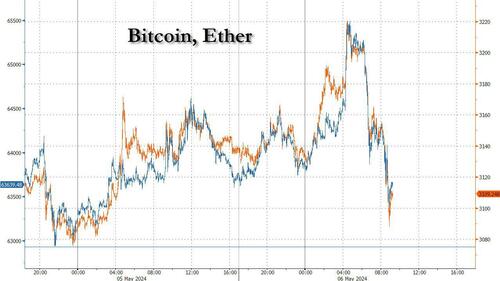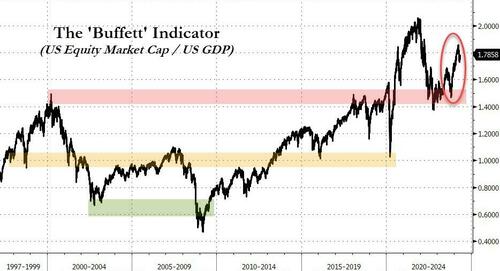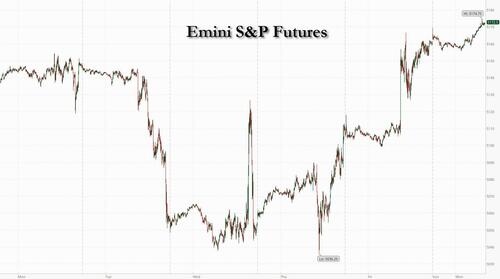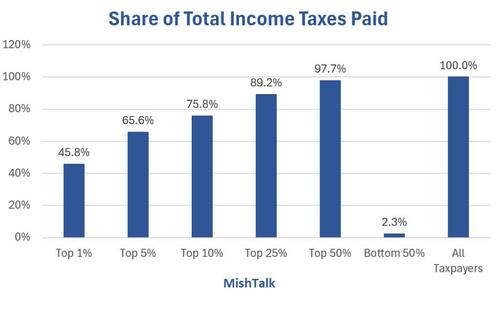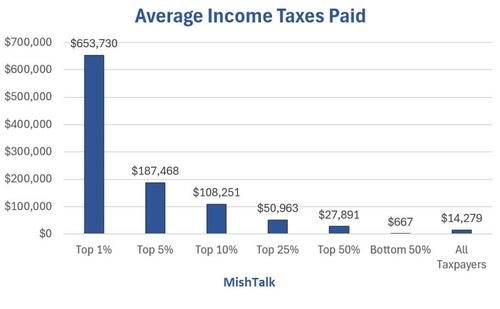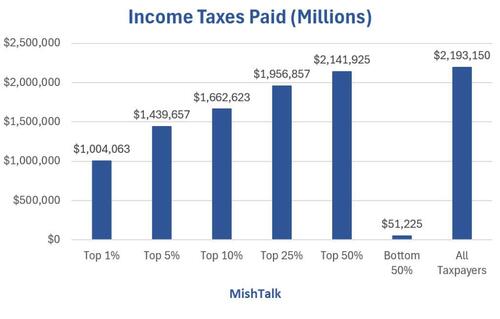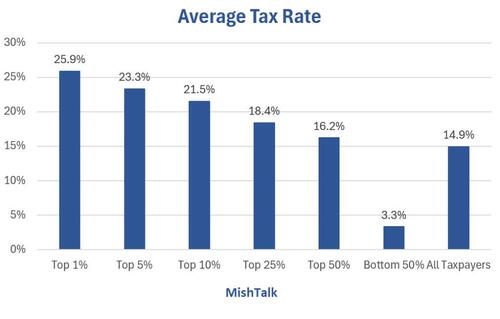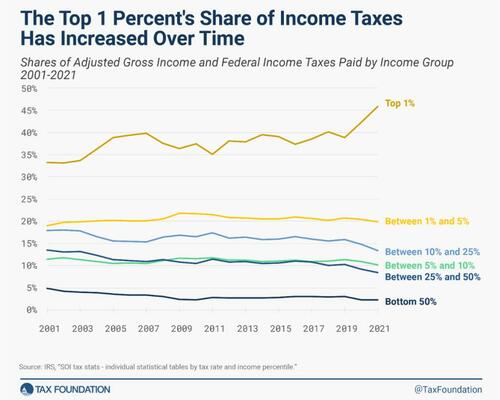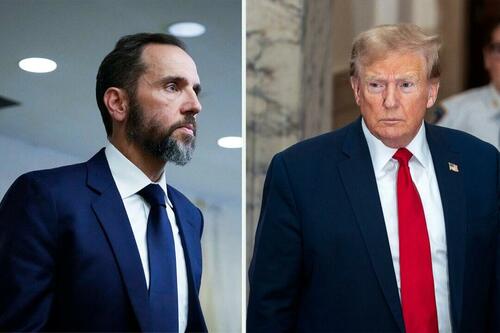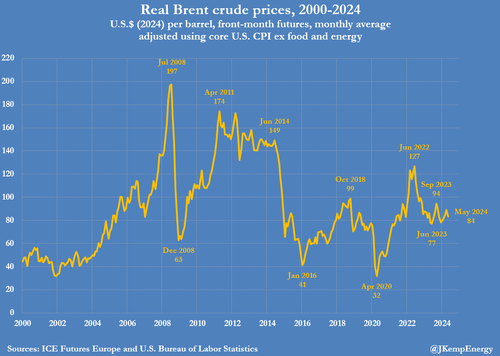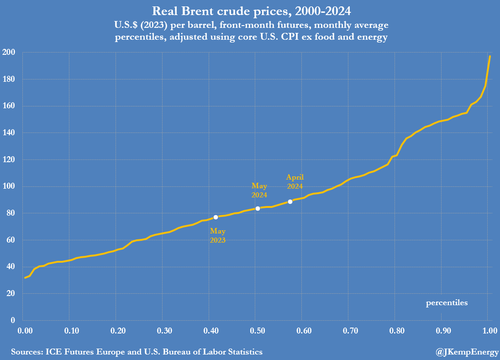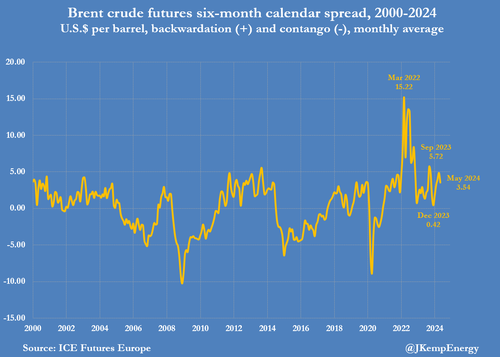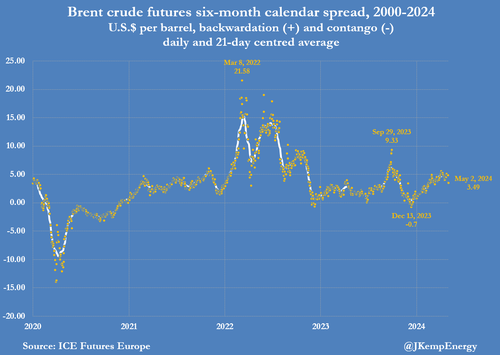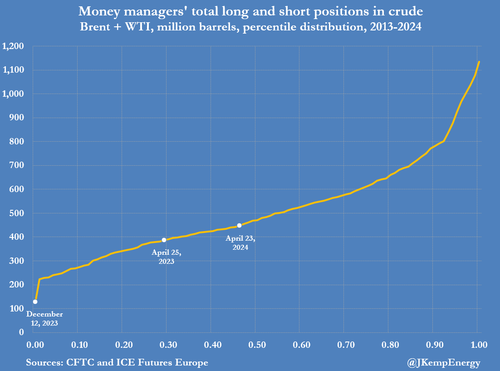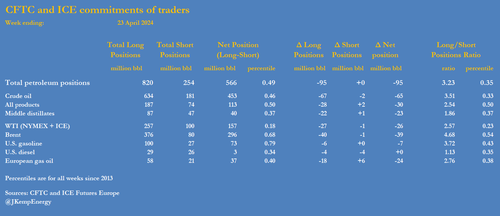“What is perfection in love? Love your enemies in such a way that you would desire to make them your brothers … For so did He love, Who hanging on the Cross, said ‘Father, forgive them, for they know not what they do.’” (Luke 23:34)
Distinction Matter - Subscribed Feeds
-
Site: Zero HedgeTrump Found In Contempt Again, Judge Threatens "Jail Sanction" NextTyler Durden Mon, 05/06/2024 - 09:39
Former President Donald Trump has been found in contempt of court for a second time by a New York judge overseeing his hush-money trial.
On Monday, judge Juan Merchan said that Trump had violated a gag order with additional social media posts about witnesses in the case, and will consider jail if there are additional violations.
Merchan:
— Adam Klasfeld (@KlasfeldReports) May 6, 2024
"The last thing that I want to do is to put you in jail," calling it a last resort.
The judge notes that Trump is a former president and possibly a future one."It appears that the $1,000 fines are not serving as a deterrent," said Merchan. "Mr. Trump, I want you to understand the last thing I want to do is put you in jail."
"The magnitude of such a decision is not lost on me, but at the end of the day, I have a job to do."
Last week, Merchan fined Trump $9,000 and held the former president in criminal contempt of court for violating the gag order nine times.
-
Site: Zero HedgeColumbia Cancels 2024 Commencement Amid Security ConcernsTyler Durden Mon, 05/06/2024 - 09:35
Columbia University announced Monday that it's canceling its two main 2024 commencement ceremonies on May 15, and will instead hold "smaller-scale, school-based celebrations," according to officials.
 Columbia University students participate in an ongoing pro-Palestinian encampment on their campus on April 26, 2024 in New York City.
Columbia University students participate in an ongoing pro-Palestinian encampment on their campus on April 26, 2024 in New York City.
(Photo: Stephanie Keith/Getty Images)The move comes after weeks of pro-Palestinian protesters had to be forcibly removed and suspended after they refused to leave their encampment which sprouted on campus April 17, when around 50 tents were pitched by students demanding a ceasefire in Gaza. The students also insist that the university divest from companies they say could be profiting from war. Dozens of faculty members came out in support.
NOW: Columbia University faculty link arms and form a wall in front of the entrance to the ‘Gaza Solidarity Encampment’ as hundreds of students encircle the both lawns
— katie smith (@probablyreadit) April 29, 2024
Students remaining in the encampment were told they could face disciplinary action after 2PM pic.twitter.com/C1XRgHzs8bAccording to NBC News, the decision was made over security concerns, after administrators at Ivy League school met with student leaders following a NYPD raid on Hamilton Hall, after student protesters broke in, barricaded themselves inside, and wrecked the place.
Taking over Hamilton Hall as done in 1968, Columbia students unfurl a banner that reads "Hind's Hall," in reference to Hind Rajab, a six-year-old girl killed by Israeli forces.
— Prem Thakker (@prem_thakker) April 30, 2024
Hundreds of students cheer as the banner is revealed, erupting into chants to "Free Palestine." pic.twitter.com/Oi8WgdZmqfDestruction inside Hamilton Hall at Columbia University, after police cleared out protesters.
— Rob (@_ROB_29) May 2, 2024
They were all released and all charges dropped so nobody will be held accountable and the destruction will continue pic.twitter.com/UM5tM5gtsF"Our students emphasized that these smaller-scale, school-based celebrations are most meaningful to them and their families," the university said Monday. "They are eager to cross the stage to applause and family pride and hear from their school’s invited guest speakers. As a result, we will focus our resources on those school ceremonies and on keeping them safe, respectful, and running smoothly."
Now, students will be "honored individually alongside their peers" in the smaller ceremonies, called "Class Days."
The "Class Days" and other school ceremonies which were originally scheduled at the South Lawn of Morningside campus have also been relocated to the Columbia Baker Athletics Complex.
"These past few weeks have been incredibly difficult for our community. Just as we are focused on making our graduation experience truly special, we continue to solicit student feedback and are looking at the possibility of a festive event on May 15 to take the place of the large, formal ceremony," said school officials.
"We are eager to all come together for our graduates and celebrate our fellow Columbians as they, and we, look ahead to the future."
Now, on May 15, graduation ceremonies will take place at different times and different locations for the the journalism school, college of physicians and surgeons, Barnard College, and the school of arts. Other school-based ceremonies will occur throughout next week as well.
The University Of Southern California was the first known major university to cancel a graduation ceremony over the nationwide demonstrations.
So all that hard work for this, kids... and on the heels of the pandemic. Normal life eludes once again.
-
Site: Zero HedgeColumbia Cancels 2024 Commencement Amid Security ConcernsTyler Durden Mon, 05/06/2024 - 09:35
Columbia University announced Monday that it's canceling its two main 2024 commencement ceremonies on May 15, and will instead hold "smaller-scale, school-based celebrations," according to officials.
 Columbia University students participate in an ongoing pro-Palestinian encampment on their campus on April 26, 2024 in New York City.
Columbia University students participate in an ongoing pro-Palestinian encampment on their campus on April 26, 2024 in New York City.
(Photo: Stephanie Keith/Getty Images)The move comes after weeks of pro-Palestinian protesters had to be forcibly removed and suspended after they refused to leave their encampment which sprouted on campus April 17, when around 50 tents were pitched by students demanding a ceasefire in Gaza. The students also insist that the university divest from companies they say could be profiting from war. Dozens of faculty members came out in support.
NOW: Columbia University faculty link arms and form a wall in front of the entrance to the ‘Gaza Solidarity Encampment’ as hundreds of students encircle the both lawns
— katie smith (@probablyreadit) April 29, 2024
Students remaining in the encampment were told they could face disciplinary action after 2PM pic.twitter.com/C1XRgHzs8bAccording to NBC News, the decision was made over security concerns, after administrators at Ivy League school met with student leaders following a NYPD raid on Hamilton Hall, after student protesters broke in, barricaded themselves inside, and wrecked the place.
Taking over Hamilton Hall as done in 1968, Columbia students unfurl a banner that reads "Hind's Hall," in reference to Hind Rajab, a six-year-old girl killed by Israeli forces.
— Prem Thakker (@prem_thakker) April 30, 2024
Hundreds of students cheer as the banner is revealed, erupting into chants to "Free Palestine." pic.twitter.com/Oi8WgdZmqfDestruction inside Hamilton Hall at Columbia University, after police cleared out protesters.
— Rob (@_ROB_29) May 2, 2024
They were all released and all charges dropped so nobody will be held accountable and the destruction will continue pic.twitter.com/UM5tM5gtsF"Our students emphasized that these smaller-scale, school-based celebrations are most meaningful to them and their families," the university said Monday. "They are eager to cross the stage to applause and family pride and hear from their school’s invited guest speakers. As a result, we will focus our resources on those school ceremonies and on keeping them safe, respectful, and running smoothly."
Now, students will be "honored individually alongside their peers" in the smaller ceremonies, called "Class Days."
The "Class Days" and other school ceremonies which were originally scheduled at the South Lawn of Morningside campus have also been relocated to the Columbia Baker Athletics Complex.
"These past few weeks have been incredibly difficult for our community. Just as we are focused on making our graduation experience truly special, we continue to solicit student feedback and are looking at the possibility of a festive event on May 15 to take the place of the large, formal ceremony," said school officials.
"We are eager to all come together for our graduates and celebrate our fellow Columbians as they, and we, look ahead to the future."
Now, on May 15, graduation ceremonies will take place at different times and different locations for the the journalism school, college of physicians and surgeons, Barnard College, and the school of arts. Other school-based ceremonies will occur throughout next week as well.
The University Of Southern California was the first known major university to cancel a graduation ceremony over the nationwide demonstrations.
So all that hard work for this, kids... and on the heels of the pandemic. Normal life eludes once again.
-
Site: Ron Paul Institute - Featured Articles
As we all know, as part of the U.S. government’s much-vaunted war-on-terrorism racket, some big technology firms have chosen to partner with the government in an effort to win the war on terrorism. In the process, they have aided the government, sometimes illegally, in the destruction of people’s privacy. The firms engage in such wrongdoing either because of some warped interpretation of “patriotism” or for money or both.
When I was a kid growing up in the 1950s and 1960s, the same thing was going on with respect to the Cold War racket. Back then, the big scary thing was communists rather than terrorists. The federal government’s Cold War propaganda convinced most everyone that the Reds were coming to get us, either from Russia, China, Cuba, North Korea, North Vietnam, East Germany, Eastern Europe, and even from here in the United States in Hollywood or the civil-rights movement.
And just like today, there were private companies that bought into the Cold War propaganda by partnering with the U.S. government to prevent a communist takeover of the United States.
One of favorite comic books when I was a kid was Superman. Every week, I would use my allowance money to purchase the newest Superman comic book at a newsstand in my hometown of Laredo, Texas. I felt like Lois Lane, Jimmy Olson, and Clark Kent were my best friends. I also loved watching the Superman television series that starred George Reeves.
I recently came across one of the televised Superman episodes named “Stamp Day for Superman.” You can watch it here. It’s a classic example of how the U.S. government was as successful in garnering the support from private entities for its Cold War racket as it is today in garnering support for its war-on-terrorism racket. It also provides a good example of how the federal government uses propaganda and indoctrination to infect the minds of the young.
The segment starts out with a stunning introduction: “The United States Treasury Department presents the Adventures of Superman.” Appearing on the screen is the logo of the Treasury Department.
The U.S. Treasury Department? Why in the world was the U.S. Treasury Department hosting a television episode of the Adventures of Superman? According to Wikipedia, the episode “was produced by Superman Inc. for the United States Department of the Treasury to promote the purchase of U.S. Savings Bonds.” (Links included in the Wikipedia entry.)
There are actually two themes within this particular episode. One theme revolves around a classic Superman type of situation. A pair of burglars breaks into a building and one of them later takes Lois Lane hostage. Superman saves the day by breaking through the thick wall in the building in which Lois is being held, saves Lois, and takes the burglar/kidnapper captive by bending and wrapping a steel rod around him.
The other theme revolves around inducing elementary school students to use their allowances and savings to purchase U.S. government stamps that can later be converted into U.S. savings bonds. I will guarantee that you will break out laughing when you see the group of over-excited kids listening to Superman deliver his pitch for buying the government’s stamps.
The episode was filmed in 1954, when the Cold War was in full swing. The notion, of course, was that everyone, including children, needed to do his part to prevent a communist takeover of the United States.
In fact, I myself fell victim to this Cold War nonsense. When I was in elementary school, I bought those stamps, just as many of my classmates did. I don’t recall what ever happened to them. I know I never converted them into bonds. So, the feds effectively got a free gift of a major portion of my allowance.
One day, my cousins from San Antonio introduced me to Marvel Comics. They immediately became my favorite comics. In fact, I pretty much gave up reading Superman and began using my money to purchase Spiderman and Fantastic Four comics. I can’t help but think that the big reason for my switch was that I subconsciously knew that the Marvel superheroes — and their creators Stan Lee, Jack Kirby, and Steve Ditko — would never cooperate with the federal government’s Cold War racket. In fact, whenever I read Marvel comics, I felt like I was engaging in something subversive. I felt like I was in a world that parents and schoolteachers simply could never understand.
Reprinted with permission from Future of Freedom Foundation.
-
Site: AsiaNews.itNepal has decided to print on its 100 rupee banknotes a map of the country that includes disputed territories with India. The Indian Foreign Minister immediately expressed his disapproval. A working group had been set up in 2024 to resolve the border dispute, but the meetings were suspended from 2019.
-
Site: Zero HedgeCryptos Dump After Robinhood Reveals SEC Wells Notice Related To Its Crypto ListingsTyler Durden Mon, 05/06/2024 - 09:19
For all its positives, bitcoin is perhaps the only security that prices in the same news over, and over, and over again (especially when the news is bad).
We saw this last month when bitcoin tumbled repeatedly after every single fake attack in the fake "Iran-Israel war", as if it was pricing nuclear Armageddon over and over instead of actually reading between the lines of the staged theater between the two middle-eastern states. It eventually rebounded and recouped most losses but not before finding something else to be just as shocked over, even though this too is not news at all.
Moments ago, bitcoin and other cryptocurrencies dumped sharply when Bloomberg reported that Ken Griffen's favorite retail frontrunning exchange, Robinhood, has received a Wells Notice, i.e., it has been formally warned by regulators that it may face an enforcement action tied to its cryptocurrency dealings.
The so-called Wells notice - which gives a company time to rebut the agency’s allegations and doesn’t necessarily indicate an enforcement action will follow - from the SEC concerns Robinhood Crypto and its cryptocurrency listings, custody of cryptocurrencies and platform operations, the company said in a regulatory filing Monday.
The agency’s staff told Robinhood that it made a “preliminary determination” to recommend that the SEC file an enforcement action.
The result could be an injunction, a cease-and-desist order, disgorgement and other penalties or limits on activities, according to the filing. The company was previously subpoenaed and has cooperated with the investigation, Robinhood said.
Dan Gallagher, chief legal, compliance, and corporate affairs officer at Robinhood Markets wrote in a May 6 blog post:
“After years of good faith attempts to work with the SEC for regulatory clarity including our well-known attempt to ‘come in and register,’ we are disappointed that the agency has decided to issue a Wells Notice related to our U.S. crypto business.”
Gallagher added that Robinhood doesn’t see any of its listed assets as securities:
“We firmly believe that the assets listed on our platform are not securities and we look forward to engaging with the SEC to make clear just how weak any case against Robinhood Crypto would be on both the facts and the law.”
Of course, anyone with a room-temperature IQ would have been able to anticipate this turn, which comes about a year after the SEC served Coinbase with an identical Wells Notice, and which comes just days before the SEC has to rule - negatively, at least until the courts force it to reverse its decision - on whether to greenlight an Ethereum ETF, something which Liz Warren's pocket fascist enforcer, Gary Gensler, has sworn he will not allow simply because it goes against the interests of Warren's biggest backers. To be sure, eventually the courts will greenlight an ETH ETF, just as Larry Fink requires in order to complete his vision of tokenization as "the next generation for markets" but not before some token resistance from the anti-crypto Democrats in Congress.
And while we wait, bitcoin and ETH both dumped on the news - as of course they always do because the algos that trade them have a 10 millisecond attention span and can't be bothered to even google that what they are reacting to has been widely priced in countless times in the past.
It goes without saying that the rebound is just a formality at this point as the algos that sold just minutes ago on the Wells Notice "news" forget why they sold, and being a momentum ignition program higher, but the bigger question is whether the end of the anti-cyrpto Biden admin in early November will be the biggest pro-bitcoin catalyst in recent history, far bigger even than the halving.
-
Site: Zero HedgeCryptos Dump After Robinhood Reveals SEC Wells Notice Related To Its Crypto ListingsTyler Durden Mon, 05/06/2024 - 09:19
For all its positives, bitcoin is perhaps the only security that prices in the same news over, and over, and over again (especially when the news is bad).
We saw this last month when bitcoin tumbled repeatedly after every single fake attack in the fake "Iran-Israel war", as if it was pricing nuclear Armageddon over and over instead of actually reading between the lines of the staged theater between the two middle-eastern states. It eventually rebounded and recouped most losses but not before finding something else to be just as shocked over, even though this too is not news at all.
Moments ago, bitcoin and other cryptocurrencies dumped sharply when Bloomberg reported that Ken Griffen's favorite retail frontrunning exchange, Robinhood, has received a Wells Notice, i.e., it has been formally warned by regulators that it may face an enforcement action tied to its cryptocurrency dealings.
The so-called Wells notice - which gives a company time to rebut the agency’s allegations and doesn’t necessarily indicate an enforcement action will follow - from the SEC concerns Robinhood Crypto and its cryptocurrency listings, custody of cryptocurrencies and platform operations, the company said in a regulatory filing Monday.
The agency’s staff told Robinhood that it made a “preliminary determination” to recommend that the SEC file an enforcement action.
The result could be an injunction, a cease-and-desist order, disgorgement and other penalties or limits on activities, according to the filing. The company was previously subpoenaed and has cooperated with the investigation, Robinhood said.
Dan Gallagher, chief legal, compliance, and corporate affairs officer at Robinhood Markets wrote in a May 6 blog post:
“After years of good faith attempts to work with the SEC for regulatory clarity including our well-known attempt to ‘come in and register,’ we are disappointed that the agency has decided to issue a Wells Notice related to our U.S. crypto business.”
Gallagher added that Robinhood doesn’t see any of its listed assets as securities:
“We firmly believe that the assets listed on our platform are not securities and we look forward to engaging with the SEC to make clear just how weak any case against Robinhood Crypto would be on both the facts and the law.”
Of course, anyone with a room-temperature IQ would have been able to anticipate this turn, which comes about a year after the SEC served Coinbase with an identical Wells Notice, and which comes just days before the SEC has to rule - negatively, at least until the courts force it to reverse its decision - on whether to greenlight an Ethereum ETF, something which Liz Warren's pocket fascist enforcer, Gary Gensler, has sworn he will not allow simply because it goes against the interests of Warren's biggest backers. To be sure, eventually the courts will greenlight an ETH ETF, just as Larry Fink requires in order to complete his vision of tokenization as "the next generation for markets" but not before some token resistance from the anti-crypto Democrats in Congress.
And while we wait, bitcoin and ETH both dumped on the news - as of course they always do because the algos that trade them have a 10 millisecond attention span and can't be bothered to even google that what they are reacting to has been widely priced in countless times in the past.
It goes without saying that the rebound is just a formality at this point as the algos that sold just minutes ago on the Wells Notice "news" forget why they sold, and being a momentum ignition program higher, but the bigger question is whether the end of the anti-cyrpto Biden admin in early November will be the biggest pro-bitcoin catalyst in recent history, far bigger even than the halving.
-
Site: Zero HedgeBerkshire's Growing Cash Pile Has A Hidden Message On StocksTyler Durden Mon, 05/06/2024 - 09:05
Authored by Ven Ram, Bloomberg cross-asset strategist,
US stocks are seeing no evil and certainly hearing none, but Berkshire Hathaway’s ever-growing cash pile should hold a tacit warning for those who are overexuberant.
Berkshire’s war chest surged to a record $189 billion at the end of the first quarter, and Chair Warren Buffett told shareholders over the weekend that he expects the pile will rise to $200 billion soon:
“We’d love to spend it, but we won’t spend it unless we think we’re doing something that has very little risk and can make us a lot of money.”
Wall Street, of course, equates higher return with higher risk, but here is one of the best investors of all time decrying the very notion that one needs to do something egregiously risky to earn the additional dollar of return over and above what is available to passive investors who buy the entire market.
Stocks rallied on Friday after the markets interpreted the April non-farm payrolls data as providing just the right backdrop for the Federal Reserve to cut rates eventually. Considering that since of the end of 2022 alone, the S&P 500 has surged about 33% and the Nasdaq almost 50%, one would think that all the good news out there and more is already reflected in their price tag.
Over the long term, stocks can’t yield returns in excess of corporate earnings and economic growth, but investors have been in no mood to listen — and they may yet stay complacent in the short term. The S&P 500 now promises an earnings yield of less than 5%, well below the historical average. The Nasdaq 100 is, of course, trading even loftier, offering a prospective earnings yield of less than 4%.
At the moment, investors are paying a lot for stocks on the premise of promise. That is what Buffett may characterize as too much risk.
-
Site: Zero HedgeBerkshire's Growing Cash Pile Has A Hidden Message On StocksTyler Durden Mon, 05/06/2024 - 09:05
Authored by Ven Ram, Bloomberg cross-asset strategist,
US stocks are seeing no evil and certainly hearing none, but Berkshire Hathaway’s ever-growing cash pile should hold a tacit warning for those who are overexuberant.
Berkshire’s war chest surged to a record $189 billion at the end of the first quarter, and Chair Warren Buffett told shareholders over the weekend that he expects the pile will rise to $200 billion soon:
“We’d love to spend it, but we won’t spend it unless we think we’re doing something that has very little risk and can make us a lot of money.”
Wall Street, of course, equates higher return with higher risk, but here is one of the best investors of all time decrying the very notion that one needs to do something egregiously risky to earn the additional dollar of return over and above what is available to passive investors who buy the entire market.
Stocks rallied on Friday after the markets interpreted the April non-farm payrolls data as providing just the right backdrop for the Federal Reserve to cut rates eventually. Considering that since of the end of 2022 alone, the S&P 500 has surged about 33% and the Nasdaq almost 50%, one would think that all the good news out there and more is already reflected in their price tag.
Over the long term, stocks can’t yield returns in excess of corporate earnings and economic growth, but investors have been in no mood to listen — and they may yet stay complacent in the short term. The S&P 500 now promises an earnings yield of less than 5%, well below the historical average. The Nasdaq 100 is, of course, trading even loftier, offering a prospective earnings yield of less than 4%.
At the moment, investors are paying a lot for stocks on the premise of promise. That is what Buffett may characterize as too much risk.
-
Site: RT - News
The IDF warned of “extreme” military action in southern Gaza, while Hamas decried what it called a “dangerous escalation”
Israel has urged Palestinians to evacuate parts of Rafah, warning that it will take “extreme” military action against Hamas militants in the southern Gaza city. The Jewish state has been preparing for an incursion in Rafah, which is currently home to over a million people, despite warnings against doing so from the US, EU, and UN.
The Israeli military issued “an urgent appeal to all residents and displaced people” living in several neighborhoods of Rafah to “evacuate immediately,” according to Avichay Adraee, the head of the Israel Defense Force’s Arab media division.
“The IDF will act with extreme force against terrorist organizations” in the area, Adraee said in a post on X (formerly Twitter) on Monday. There was no clarification on when the military action might start.
Read more No international pressure can stop Israel – Netanyahu
No international pressure can stop Israel – Netanyahu
A senior Hamas official has told Reuters that the evacuation order was a “dangerous escalation” that would have consequences.
The evacuation call comes a day after Israel closed the main border crossing used to deliver humanitarian aid into Gaza. The closure came in response to a Hamas rocket attack that left three soldiers dead and 11 wounded on Sunday.
West Jerusalem claims Rafah is the last significant stronghold of Hamas, and that potentially dozens of Israeli hostages may be held there. Victory over the militant group is impossible without taking the city, the Israeli government insists.
READ MORE: Israel shuts down Gaza border crossing after Hamas attack
According to the UN agency for Palestinian refugees, Rafah is currently home to 1.4 million Palestinians who have fled the northern parts of the enclave since October. The international community has sounded the alarm over the number of civilian casualties that a military operation in the city could cause.
Top EU diplomat Josep Borrell has described the Rafah evacuation order as “unacceptable” and demanded that Israel denounce its ground offensive plan.
The Rafah plan has opened a rift between Israel and its staunchest ally, the US. The administration of President Joe Biden previously declared that an Israeli invasion of the city would be a “red line,” a statement that was dismissed by Prime Minister Benyamin Netanyahu. Washington has been under increasing pressure from the UN, pro-Palestinian protesters, and human rights organizations to stop arming Israel.
READ MORE: US froze military aid shipment to Israel – Axios
Netanyahu declared war on Hamas after the Palestinian militant group launched a surprise attack on Israel on October 7, killing around 1,200 people and taking around 250 hostages. The death toll from Israel’s retaliation in the enclave is approaching 35,000, according to the Palestinian health authorities.
-
Site: AsiaNews.itManahel al-Qatabi's conviction for seeking an end to male guardianship is just the latest of a long list. A man who denounced corruption and human rights violations on social media was given a death sentence. Scores of people are serving 'lengthy' prison terms.
-
Site: RT - News
Tomasz Szmydt, who is seeking asylum in Belarus, says Warsaw’s foreign policy is dictated by the US and its allies
Polish judge Tomasz Szmydt has asked for political asylum in Belarus in protest over his country’s “unfair and dishonest” anti-Russia stance.
Szmydt, who served at the Provincial Administrative Court in Warsaw and was the head of the legal department at the National Council of Judges, says he was forced to leave his home country after being persecuted and threatened for his “independent political position.” He gave a press conference in Minsk on Monday, where he publicly resigned from his post and asked the Belarusian authorities for protection.
“The resignation from my position as judge is my way to protest against the unfair and dishonest policy pursued by the Polish authorities towards the Republic of Belarus and the Russian Federation,” Szmydt told reporters, as cited by Belta news agency.
According to Szmydt, he has never witnessed any negative attitude towards Russia or Belarus from ordinary Poles, and the anti-Russia sentiment that’s being whipped up by the government in Warsaw has Western roots.
“The situation is such that the US wants to drag Poland into the war, to make it a direct participant in the armed conflict. To prevent this, I have to talk about it, but in Poland I cannot do this,” Szmydt stated, adding that Poland’s foreign policy is directly influenced by the US, UK, and Germany.
Read more ‘Not our war’: Poles march against Ukraine aid (VIDEO)
‘Not our war’: Poles march against Ukraine aid (VIDEO)
He said his departure from Poland and his resignation are in protest “against actions that are aimed at involving my country in a direct armed conflict.” Szmydt urged the Polish government to “normalize and regulate good neighborly relations” between Warsaw, Moscow, and Minsk.
Szmydt added that his resignation will be handed over to the appropriate authorities in Poland through the Polish consulate in Belarus. He plans to apply for political refugee status.
“I am asking for political asylum in the Republic of Belarus. This is an informal request at this time, but... if I want to live, returning to Poland is impossible for me,” he stated.
Commenting on the judge’s resignation and statements, Polish Foreign Minister Radoslaw Sikorski said he was “shocked,” adding that Szmydt’s actions appear to be those of a “traitor.” Defense Minister Wladyslaw Kosiniak-Kamysz said he ordered an investigation into Szmydt’s actions.
READ MORE: EU leaders ‘fooling’ people with horror stories about Russia – Kremlin
Poland has been one of Ukraine’s key backers amid the conflict between Kiev and Moscow, which broke out in February 2022. The country has sent military aid to Ukraine and has served as a hub for weapons provided by other Western nations. Warsaw has grown increasingly hostile in its attitude towards Russia as the conflict drags on. President Andrzej Duda recently signaled that his country is open to hosting US nuclear weapons in order to “strengthen the security of NATO’s eastern flank,” which he claims Russia could attack if it secures victory in Ukraine.
-
Site: Rorate Caeli________________________Mary alone found grace before God without the help of any other creature. All those who have since found grace before God have found it only through her. She was full of grace when she was greeted by the Archangel Gabriel and was filled with grace to overflowing by the Holy Spirit when he so mysteriously overshadowed her. From day to day, from moment to moment, she New Catholichttp://www.blogger.com/profile/04118576661605931910noreply@blogger.com
-
Site: RT - News
Alexander Lambsdorff will leave for one week for consultations over an alleged hacking operation
The German Foreign Ministry is temporarily recalling Ambassador Alexander Lambsdorff from Moscow, its spokesperson announced on Monday.
The senior diplomat will hold consultations before returning to Russia, according to the statement. The move comes after Berlin accused the Kremlin of being behind a hacking attack targeting senior members of the Social Democratic Party (SPD) of Chancellor Olaf Scholz.
The German government claims that a group named ‘АРТ28’ is a front for the Russian Foreign Intelligence Service, and used a vulnerability in Microsoft Outlook software to spy on the party’s leadership. It described the hack as part of a prolonged campaign targeting various entities in Germany, and claimed that it had identified the culprit in conjunction with NATO and EU partners.
”Cyberattacks on political parties, state institutions and critical infrastructure are a threat to our democracy, our national security and our free society,” the German embassy in Moscow said in a statement on Monday.
Read more Russian military destroys German-made IRIS-T system in Ukraine (VIDEO)
Russian military destroys German-made IRIS-T system in Ukraine (VIDEO)
Last week, the Russian embassy in Berlin confirmed receiving a demarche from the German Foreign Ministry over the alleged cyberespionage. It said the accusations were “lacking evidence” and an “unfriendly act aimed at inciting anti-Russian sentiment” in the country.
In March, already tense Russian-German relations suffered a blow when a leaked recording of discussions between senior German military officers was published by Russian media. The tape highlighted Berlin’s involvement in the Ukraine conflict and included a debate on how the possible role of German troops in a proposed attack on Crimea using Taurus cruise missiles could be concealed from the public.
Scholz had publicly refused to provide the weapons, stating that unlike the UK and France, Germany was not prepared to send military personnel to prepare such strikes. German generals on the leaked recording were exploring ways to nudge the chancellor towards allowing such arms supplies.
-
Site: LifeNews
If there’s any politician who deserves the Presidential Medal of Freedom the least, it would be Nancy Pelosi.
Pelosi is a radical abortion activist who has pushed abortions up to birth for decades. She’s trashed pro-life Americans repeatedly, refused to acknowledge the humanity of unborn children, and did her level best to push taxpayer funded abortions on Americans time and time again.
But perhaps the worst thing Pelosi has ever done is deny a vote on a bill to stop infanticide and protect babies who survive abortions.
Not only did she block a vote on one of the most common sense bills Congress could ever vote on, she blocked a vote 80 different times. Over and over again, day after day, Republicans a few years ago requested a vote on a bill to protect babies from infanticide. But day after day Pelosi, when she was Speaker of the House, refused to allow a vote.
That didn’t stop Biden from giving her Americas highest civilian award.
“The Presidential Medal of Freedom, our nation’s highest civilian award — we the people doing what we can to ensure the idea of America, the cause of freedom, shines like the sun to light up the future of the world,” Biden said of the medal in a video promoting the award to Pelosi.
Click here to sign up for pro-life news alerts from LifeNews.com
Rep. Ann Wagner condemned Pelosi’s actions at the time.
“Pelosi directed House Democrats to block one specific piece of legislation over and over. Democrats designated one person to stand up and object, every single day, when Republicans tried to bring this bill to the House floor,” she said.
What legislation could possibly make Pelosi and House Democrats so afraid that they’d go out of their way to avoid even voting on it—after blocking it more than 80 times in total?
The answer is both surprising and distressing: The bill was the Born-Alive Abortion Survivors Protection Act. The Born-Alive Act simply says that a baby who survives an abortion deserves the same degree of medical care as any other newborn—it is a commonsense bill that is narrow in scope, saves lives, and addresses a real problem.
Of course, Democrats might then be forced to acknowledge that every baby is a human being. And so long as Democrats are beholden to pro-abortion radicals for funding, votes, and media cover, they will do everything in their power to prevent the Born-Alive Act from coming to the House floor for a vote or being passed into law.
The Presidential Medal of Freedom was established in 1963 by President John F. Kennedy. It replaced the Medal of Freedom established by President Harry S. Truman in 1945, which honored individuals who rendered significant aid to the U.S. in World War II.
It is the highest civilian award in the nation and is intended to recognize “any person who has made an especially meritorious contribution to (1) the security or national interests of the United States, or (2) world peace, or (3) cultural or other significant public or private endeavors.”

The post Joe Biden Gives National Award to Nancy Pelosi, Who Refused to Stop Infanticide 80 Times appeared first on LifeNews.com.
-
Site: Zero Hedge'Romance' Scammer Promised Fake Gold To Bilk Victims For MillionsTyler Durden Mon, 05/06/2024 - 08:25
Authored by Ken Silva via Headline USA,
It was an old-fashioned romance scam, involving a man posing as a female online to induce unfortunate men to send him their life savings.
This scam, however, was fairly complex, involving a fake bank website and non-existent gold bars. The alleged perpetrator of this scam, Richard Opoku Agyemang, was arrested last month by the U.S. Postal Inspection Service.
According to the complaint against Agyemang, a USPIS agent interviewed a victim in January who sent $345,280 to Agyemang, who was posing online as “Emily.”
The victim told the USPIS agent that Emily spoke with an accent and purported to reside in Miami, where she was working as an ICU nurse at Jackson Memorial Hospital.
Eventually, Emily began asking the victim for money, which he sent to her. Emily told him the funds were going to pay for experimental and expensive medications meant for her mother in London.
“According to Victim 1, Emily also said she needed more money to pay ‘Mercury Assets Security Company’ in order to release two boxes of gold bars worth $9.2 million,” the complaint said.
“Victim 1 has never met Emily in person and has not received any gold bars.”
A second victim in New Mexico allegedly sent Agyemang $410,000 while the defendant was posing online as “Kathy.”
That victim told the same USPIS agent he developed a romantic relationship with “Kathy” that moved to text messages and eventually to speaking on Skype and via email. Instead of enticing him with gold, “Kathy” told the second victim “she” was supposed to be receiving an inheritance of diamond stones from her deceased father valued at $3.8 million.
The scam against the second victim also involved a fake bank website, according to the complaint.
“Based on screenshots of emails provided by Victim 2, it appears that the suspects created fraudulent websites for the First National Bank of London and for Neelevet, as well as fraudulent ‘customer support’ communications,” the complaint said.
The Virginia and New Mexico victims were the only ones highlighted in the criminal complaint, but the USPIS agent said there are at least “four dozen” other victims that have been bilked for more than $2 million combined.
“I have been able to interview some of the other suspected victims and confirmed that, at least as to those individuals, the funds were sent in connection with a romance fraud,” the agent said in his affidavit.
“For example, one victim provided copies of emails showing that he had been induced to send $13,000 to the RISUN LLC Wells Fargo account to pay for alleged taxes on gold bars being imported to the United States by his alleged online romantic partner.”
Agyemang was indicted on April 24 with one count of conspiracy to commit wire fraud, six counts of money laundering, and several other charges.
He currently has a jury trial set for June 24, though, at this early stage of the case, it’s likely that the Justice Department has yet to offer him a plea deal.
Ken Silva is a staff writer at Headline USA. Follow him at twitter.com/jd_cashless.
-
Site: Zero Hedge'Romance' Scammer Promised Fake Gold To Bilk Victims For MillionsTyler Durden Mon, 05/06/2024 - 08:25
Authored by Ken Silva via Headline USA,
It was an old-fashioned romance scam, involving a man posing as a female online to induce unfortunate men to send him their life savings.
This scam, however, was fairly complex, involving a fake bank website and non-existent gold bars. The alleged perpetrator of this scam, Richard Opoku Agyemang, was arrested last month by the U.S. Postal Inspection Service.
According to the complaint against Agyemang, a USPIS agent interviewed a victim in January who sent $345,280 to Agyemang, who was posing online as “Emily.”
The victim told the USPIS agent that Emily spoke with an accent and purported to reside in Miami, where she was working as an ICU nurse at Jackson Memorial Hospital.
Eventually, Emily began asking the victim for money, which he sent to her. Emily told him the funds were going to pay for experimental and expensive medications meant for her mother in London.
“According to Victim 1, Emily also said she needed more money to pay ‘Mercury Assets Security Company’ in order to release two boxes of gold bars worth $9.2 million,” the complaint said.
“Victim 1 has never met Emily in person and has not received any gold bars.”
A second victim in New Mexico allegedly sent Agyemang $410,000 while the defendant was posing online as “Kathy.”
That victim told the same USPIS agent he developed a romantic relationship with “Kathy” that moved to text messages and eventually to speaking on Skype and via email. Instead of enticing him with gold, “Kathy” told the second victim “she” was supposed to be receiving an inheritance of diamond stones from her deceased father valued at $3.8 million.
The scam against the second victim also involved a fake bank website, according to the complaint.
“Based on screenshots of emails provided by Victim 2, it appears that the suspects created fraudulent websites for the First National Bank of London and for Neelevet, as well as fraudulent ‘customer support’ communications,” the complaint said.
The Virginia and New Mexico victims were the only ones highlighted in the criminal complaint, but the USPIS agent said there are at least “four dozen” other victims that have been bilked for more than $2 million combined.
“I have been able to interview some of the other suspected victims and confirmed that, at least as to those individuals, the funds were sent in connection with a romance fraud,” the agent said in his affidavit.
“For example, one victim provided copies of emails showing that he had been induced to send $13,000 to the RISUN LLC Wells Fargo account to pay for alleged taxes on gold bars being imported to the United States by his alleged online romantic partner.”
Agyemang was indicted on April 24 with one count of conspiracy to commit wire fraud, six counts of money laundering, and several other charges.
He currently has a jury trial set for June 24, though, at this early stage of the case, it’s likely that the Justice Department has yet to offer him a plea deal.
Ken Silva is a staff writer at Headline USA. Follow him at twitter.com/jd_cashless.
-
Site: Zero HedgeFutures, Global Markets Rise On Rising Fed Cut BetsTyler Durden Mon, 05/06/2024 - 08:11
Global stocks and US equity futures jumped to start the new week, with the S&P 500 poised to extend last week’s rally as traders grew increasingly confident in the likelihood that the Fed will cut interest rates this year. As of 7:40am, S&P 500 and Nasdaq 100 futures added 0.3%, tracking gains in European and Asian markets although trading volumes were lower than average as UK and Japanese markets are shut for a holiday. Apple slid in pre-market trading after Berkshire Hathaway trimmed its stake for a second consecutive quarter. German 10-year yields fell and the yen weakened. Oil advanced after Saudi Arabia raised prices for customers in Asia. On today's calendar we get the latest Senior Loan Officer Opinion Survey (SLOOS) which will signal whether demand for tight credit remains dismal.
In premarket trading, Apple dropped 1.2% after rising strongly over the past two sessions and as Berkshire Hathaway reported it had trimmed its stake in the company. Shares in cryptocurrency-linked companies rally as Bitcoin nears $65,000 level after adding around 10% in the last four sessions. Some of the biggest movers are Marathon Digital (MARA US) +5.6%, Riot Platforms (RIOT US) +4.1%. Steward Health Care filed voluntary petitions for relief under Chapter 11. Here are some other notable premarket movers:
- Luminar Technologies shares fall as much as 17% after the company confirmed it will cut about 20% of jobs and sub-lease parts or all of some facilities.
- Paramount rises 4.5% as it weighs Apollo and Sony’s $26 billion offer to buy the company.
- Perficient gains 55% after EQT agreed to buy the technology consultant in a deal valued at about $3 billion including debt.
With a light US economic calendar this week, the market’s direction may come from central bank officials, as well as policy meetings in the UK, Australia and Sweden. European Central Bank Chief Economist Philip Lane said recent data have made him more certain that inflation is returning to the 2% goal, according to an interview with Spanish newspaper El Confidencial, raising the likelihood a first interest-rate cut in June. New York Fed President John Williams and the Richmond Fed’s Thomas Barkin are due to make remarks on Monday, followed by Neel Kashkari of Minneapolis on Tuesday.
“This week is expected to be calmer on the economic front: few economic data releases and limited central bankers’ intervention,” wrote Credit Agricole strategists led by Jean-Francois Paren.
But while this week may be boring, strategists are already starting to hone in on the importance of next week’s US inflation print for April. “The price reaction on the back of this release may be more important than the data itself given how influential price action has been on investor sentiment amid an uncertain macro set up,” Michael Wilson wrote in a note.
Europe was broadly higher, tracking US equity futures, with the Stoxx 600 rising 0.6% and trading near session highs although volumes were low due a UK public holiday. Among individual stocks in Europe, PostNL NV shares declined after it reported weak volumes. Demant A/S also fell as it reported a miss in sales driven by soft retail. Atos SE jumped after it received four offers that will frame the discussions with its stakeholders around its restructuring. Here are the biggest movers Monday:
- Indra Sistemas shares jump as much as 11%, after the Spanish defense company beat estimates in the first quarter and forecast Ebit for the full year of above EU400 million
- Know IT gains as much as 6% after Handelsbanken raised its short-term recommendation for the Swedish IT consultancy to hold from sell, noting small green shoots in end markets
- Maurel & Prom rise as much as 10%, the most since October, after the French oil firm received a license for operations in the Urdaneta Oeste field in Lake Maracaibo in Venezuela
- Demant falls as much as 5.3%, the most since November, after the Danish hearing-aid group reported softer-than-expected 1Q sales, with retail a stand-out disappointment, Citi says
- Castellum falls as much as 3% after DNB cut its recommendation for the Swedish landlord to hold, noting “rather soft” 1Q earnings which showed that vacancy rates is a concern
- ING Bank Slaski falls as much as 4.3% after the bank reported first-quarter results below estimates. Citi attributed the earnings miss to low non-core revenue figures and higher net provisioning
Earlier in the session, Asia stocks rose led by Chinese shares which led gains as mainland markets played catchup following a holiday break, although here too conditions were holiday-thinned with Japan and South Korea shut for holidays. The CSI 300 Index jumped as much as 1.8%, while stocks in Hong Kong took a breather following a nine-day winning streak.
- Hang Seng & Shanghai Comp were somewhat varied as Hong Kong stocks took a breather after the recent hot streak and as attention shifted to the mainland where stocks outperformed as they played catch up on their return from the Labour Day Golden Week holidays with property stocks boosted by recent support pledges, while participants also digested Caixin Services PMI data which matched estimates.
- ASX 200 was led higher by continued outperformance in the rate-sensitive sectors, while financials were also underpinned following Westpac's earnings, special dividend and buyback announcement.
In FX, the Blooomberg Dollar index steadied as the Norwegian krone, British pound and Australian dollar led Group-of-10 gains; The prospect of central bank easing boosted risk sentiment sending global stocks higher. USD/JPY advanced as much as 0.6% to 154, paring some of last week’s more than 3% drop as short dollar positions by fast-money accounts were squeezed, according to an Asia-based FX trader. EUR/USD steadied around 1.0768, after composite PMI data for April came in above estimates and euro-area PPI for March fell 0.4% month-on-month in line with forecasts; ECB Chief Economist Philip Lane said recent data has made him more confident inflation will return to the 2% goal.
In rates, Treasuries reopened with yields lower by around 2bps at 4.48% after being closed for Japan and UK holidays. Gains have support from bunds, rallying on comments from ECB Chief Economist Philip Lane. US yields lower by around 2bp to 3bp across the curve with German yields down 3bp to 5bp after ECB’s Lane said recent data has improved his confidence that inflation will return to the 2% goal. Treasury auction cycle begins Tuesday with $58b 3-year note sale, followed by $42b 10- and $25b 30-year new issues Wednesday and Thursday.
In commodities, oil rebounded strongly after tumbling on Friday as hopes for a ceasefire in the Middle East once again died a miserable death. WTI traded 1.2% higher above $79 and Brent rose to $83.70. Gold was also significantly higher, trading about $2320.
In crypto, Bitcoin is back on a firmer footing and now holds around $65k, while Ethereum hovers around $3.2k, both have erased last week's sharp losses. The next potential objective/resistance level for Bitcoin is at $67,200 and that represents a 61.8% correction of the 73,797-56,527 fall, via market contacts.
Looking at today's calendar, the US economic data slate empty for the session, though Fed releases Senior Loan Officer opinion survey on bank lending practices at 2pm New York time. The calendar is light this week, leaving focus on Treasury refunding auctions and about a dozen Fed speakers scheduled. Fed members’ scheduled speeches include Barkin (12:50pm) and Williams (1pm). Ahead this week are Kashkari, Jefferson, Collins, Cook, Daly, Bowman, Logan, Goolsbee, Barr and Mester
Market Snapshot
- S&P 500 futures up 0.2% to 5,165.25
- STOXX Europe 600 up 0.3% to 506.89
- MXAP up 0.3% to 178.04
- MXAPJ up 0.7% to 551.80
- Nikkei little changed at 38,236.07
- Topix little changed at 2,728.53
- Hang Seng Index up 0.6% to 18,578.30
- Shanghai Composite up 1.2% to 3,140.72
- Sensex little changed at 73,916.80
- Australia S&P/ASX 200 up 0.7% to 7,682.37
- Kospi down 0.3% to 2,676.63
- German 10Y yield little changed at 2.46%
- Euro up 0.1% to $1.0775
- Brent Futures up 0.9% to $83.74/bbl
- Gold spot up 0.8% to $2,319.71
- US Dollar Index little changed at 105.03
Top Overnight News
- China’s May Day holiday saw aggregate spending rise 13.5% above pre-pandemic levels, although spending per capita lagged behind 2019 levels. RTRS
- China’s effective exchange rate is back to where it was in 2014 in real terms (given CNY weakness and the absence of domestic inflation) and this is turbocharging the country’s exports, creating trade friction with the US, EU, and other economies. WSJ
- The case for a ECB interest rate cut in June is getting stronger as services inflation is finally starting to ease, ECB Chief Economist Philip Lane told Spanish newspaper El Confidencial on Monday. The ECB has all but promised a rate cut on June 6, provided incoming data strengthen policymakers' belief that inflation will head back to its 2% target by the middle of next year. RTRS
- A US crackdown on banks financing trade in goods for Vladimir Putin’s invasion of Ukraine has made it much more difficult to move money in and out of Russia, according to senior western officials and Russian financiers. Moscow’s trade volumes with key partners such as Turkey and China have slumped in the first quarter of this year after the US targeted international banks helping Russia acquire critical products to aid its war effort. FT
- The Israeli military has told tens of thousands of Palestinians to leave the southern Gazan city of Rafah as Israel’s defense minister warned of an imminent military “operation” as talks to free Israeli hostages appeared to have stalled. At least 100,000 civilians in eastern Rafah, along the border with Israel, should move to what Israel calls a humanitarian zone on the Mediterranean, an Israel Defense Force spokesperson told reporters, in “a limited scope” operation as part of a “gradual plan”. FT
- Saudi Arabia and its allies in OPEC+ are likely to keep oil production unchanged for a further three months when ministers review output allocations on June 1. The tightening of petroleum supplies and depletion of inventories widely anticipated at the start of the year has failed to materialize so far. RTRS
- Maersk warned that ongoing Red Sea shipping disruptions will reduce industry capacity between the Far East and Europe by 15-20% in Q2. RTRS
- The final chief executive of Credit Suisse, Ulrich Körner, is set to leave UBS in the coming weeks, as the Swiss bank prepares to complete a crucial step in the integration of its former rival. FT
- Warren Buffett said Apple is “even better” than AmEx and Coca-Cola. The stock will remain Berkshire’s top holding despite selling a large chunk. The sale bolstered his firm’s cash pile to a record $189 billion. BBG
A more detailed look at global markets courtesy of Newsquawk
APAC stocks traded with a positive bias after a dovish jobs report from the US but with the upside limited amid holiday-thinned conditions with Japan and South Korea shut for holidays. ASX 200 was led higher by continued outperformance in the rate-sensitive sectors, while financials were also underpinned following Westpac's earnings, special dividend and buyback announcement. Hang Seng & Shanghai Comp were somewhat varied as Hong Kong stocks took a breather after the recent hot streak and as attention shifted to the mainland where stocks outperformed as they played catch up on their return from the Labour Day Golden Week holidays with property stocks boosted by recent support pledges, while participants also digested Caixin Services PMI data which matched estimates.
Top Asian News
- PBoC Shanghai is reportedly to support the renewal of large-scale equipment.
- Chinese President Xi said the China-France relationship is a model of peaceful coexistence and win-win cooperation between countries with different systems, while he added they are ready to consolidate the traditional friendship, enhance political mutual trust, build strategic consensus, as well as deepen exchanges and cooperation with France, according to Xinhua.
- EU is lobbying China to exclude agriculture from a series of escalating commercial disputes and called for the ‘strategic sector’ to be protected from trade tensions in the renewable energy and electric vehicle industries, according to FT.
- A magnitude 6.1 earthquake was reported in Seram, Indonesia, according to GFZ.
European bourses, Stoxx600 (+0.3%) are entirely in the green, albeit modestly so, taking impetus from a positive APAC session. EZ Final PMIs were generally revised higher, though ultimately sparked little reaction in the equities complex. European sectors are mostly firmer, though with the breadth of the market fairly narrow. Insurance takes the top spot, alongside Energy. The latter is benefitting from broader strength in the crude complex given the recent updates around Rafah. US Equity Futures (ES +0.2%, NQ +0.2%, RTY +0.5%) are entirely in the green, building on the strength seen on Friday. Apple (-1.1%) is lower pre-market after Berkshire Hathaway declared it had decreased its stake in the Co. in Q1 and in a breather from Friday's post-earnings strength.
Top European News
- UK PM Sunak reportedly cancelled plans for a summer general election after local election defeats with the election anticipated to occur in Autumn, according to The Telegraph.
- UK PM Sunak was warned by Conservative MPs to show some vision and start digging his party out of a hole after a disastrous set of local election results, while it was also reported that the Labour Party comfortably won the London mayoral contest to give Sadiq Khan an unprecedented third term as London Mayor, according to FT.
- ArcelorMittal (MT NA) warned the UK government that one of its main divisions could be forced to exit the UK if an application to close and redevelop a commercial port in south-east England receives approval this week, according to FT.
- ECB's Lane said in an interview with El Confidencial that the April slowdown in services inflation marks significant progress and confidence on inflation is improving, while he added exaggerating the impact of the ECB and Fed divergence is not necessary and Fed decisions have limited impact on the euro area.
- Fitch affirmed Italy at BBB; Outlook Stable and affirmed Denmark at AAA; Outlook Stable on Friday.
FX
- DXY is modestly softer and within a very tight 105.02-20 range, should selling pressure intensify, the 105.00 mark could be brought into focus.
- EUR is marginally firmer/flat vs the Dollar, though losing in the EUR/GBP cross. Price action today has been contained within a tight 1.0756-75 range, well within the prior session’s bounds. EZ final PMIs today were generally revised higher, albeit slightly, and provided little lasting move in the EUR.
- GBP is slightly firmer against the Dollar, despite UK equities/gilt markets closed on account of the region's bank holiday and with catalyst light. Currently trading just off session highs of 1.2584.
- JPY is by far the biggest underperformer vs the Dollar, going as high as 154.00, paring much of Friday’s USD/JPY losses, amid holiday-thinned conditions with Japan away.
- Antipodeans are both marginally firmer vs USD, though very much within a contained range as catalysts remain thin. Over in China, the Caixin PMI were in-line with expectations which helped to lift sentiment on the region's return from holiday.
- PBoC set USD/CNY mid-point at 7.0994 vs exp. 7.2127 (prev. 7.1063).
- S&P upgraded Turkey’s rating to 'B+'; Outlook Positive on Friday and cited economic rebalancing.
Fixed Income
- Bunds are bid with specific drivers limited, though upside was trimmed by unusually large upward revisions to the French and then EZ Final PMIs though the internal commentary around German continues to point to stagnation/incremental growth. Current 130.98-131.62 parameters surpassed Friday's best by a handful of ticks with little of note thereafter until 132.00.
- USTs are a touch firmer, in-fitting with EGBs, but with magnitudes thin given the UK Bank Holiday and Japan's absence; docket ahead a touch busier with Fed's Barkin & Williams due after the latest Employment Trend numbers.
Commodities
- Crude benchmarks are bid with geopols in focus. WTI and Brent have been grinding higher throughout the morning as the geopolitical narrative around Rafah continues to gradually escalate. Most recent developments have civilians being evacuated and the Israeli Finance Minister saying the army must enter Rafah today.
- Supported on geopols; XAU to a USD 2324/oz peak but one that leaves it over USD 20/oz shy of last week's best but with the USD 2339/oz 21-DMA the first point of resistance.
- Base metals are bid on China's return to the market with the metal following suit to APAC performance where the region was propped up by Friday's NFP-tailwinds and in-line Chinese PMIs.
- Saudi Arabia raised its oil prices for all grades to Asia for June with Arab Light OSP to Asia set at a premium of USD 2.90/bbl vs Oman/Dubai average and OSP to NW Europe set at a premium of USD 2.10/bbl vs ICE Brent, while it set the OSP to the US at a premium of USD 4.75/bbl vs ASCI.
- UAE’s Sharjah announced the discovery of a new gas field which is said to carry ‘promising quantities’, according to a statement cited by Reuters.
Geopolitics: Middle East
- Israeli forces are now launching raids east of Rafah, via Sky News
- Israel military says not going to put a timeframe on the Rafah evacuation and will make "operation assessments"
- Israeli military says evacuating Rafah as part of a "limited scope" operation
- The Israeli army has ordered civilians in several parts of Rafah to leave the city as it begins an invasion of the southern city, via journalist Soylu
- Israeli Defence Minister, speaking with US Defence Secretary Austin, that action in Rafah is required due to Hamas' refusal of hostage-release proposals
- Senior Hamas Official says to Reuters that Israel's Rafah evacuation order is a "dangerous escalation that will have consequences"; Hamas may withdraw from truce talks due to Rafah operations.
- Israel’s military said the Kerem Shalom Crossing with Gaza is now closed to aid trucks after it came under fire with mortar shelling which killed 3 Israeli soldiers and wounded 12 others from the Givanti and Nahal brigades, while Hamas claimed responsibility for the mortar attack on Kerem Shalom and said it targeted an Israeli army base, according to Reuters.
- Israeli PM Netanyahu said they cannot accept Hamas’s demands for an end to the war and the withdrawal of forces from Gaza, while he noted that ending the Gaza war now would keep Hamas in power and Israel would not accept terms that amount to a capitulation with Israel to keep fighting until its war aims are achieved. It was separately reported that Israel’s Defence Minister said Hamas appears uninterested in a deal meaning strong military action in Gaza’s Rafah could happen very soon, according to Reuters.
- Israeli army is said to have started to evacuate civilians from parts of Rafah, according to Haaretz cited by Walla's Guy Elster. Subsequently, Bloomberg reported that the Israeli military asks some Rafah civilians to move out of the city, according to Bloomberg.
- Hamas’ leader said they are still keen on reaching a comprehensive agreement, while the group said the round of negotiations in Cairo has ended and the delegation will leave to consult with the group’s leadership, according to Reuters. It was separately reported that Hamas agrees that Israel can commit to ending the war in the second stage of the hostage deal not the first, according to Times of Israel via social media platform X.
- CIA chief Burns is to travel to Doha for an emergency meeting with Qatar’s PM as Gaza talks are said to be ‘near to collapse’, while Qatar and the US are to exert maximum pressure on Israel and Hamas to continue negotiations, according to an official briefed on talks cited by Reuters. It was separately reported that Burns will stay in Qatar on Monday and likely travel to Israel this week to meet with Israeli PM Netanyahu, according to an Axios reporter.
- US reportedly put a hold on an ammunition shipment to Israel last week, according to two Israeli officials cited by Axios.
- Iraqi armed factions announced they targeted an Israeli air base in Eilat with drones, according to Al Arabiya.
- Israeli Cabinet decided to close Qatari TV network Al Jazeera’s operations in Gaza, according to a statement cited by Reuters. It was later reported that Israel’s communications ministry said a police raid was conducted at an Al Jazeera premises in Jerusalem.
Geopolitics:
- Russia said it took full control of Ocheretyne village in eastern Ukraine, according to the Defence Ministry, cited by Reuters.
- Russian Defence Ministry says preparations are beginning for the commencement of a missile exercises in the southern district, incl. aviation & navy forces
US Event Calendar
- 14:00: Senior Loan Officer Opinion Survey on Bank Lending Practices
Central Bank Speakers
- 12:50: Fed’s Barkin Speaks on Economic Outlook
- 13:00: Fed’s Williams Participates in Fireside Chat
- 14:00: Senior Loan Officer Opinion Survey on Bank Lending Practices
DB's Peter Sidorov concludes the overnight wrap
Filling in for Jim with the UK off for the May Day bank holiday. As the calendar takes a quieter turn after the deluge of macro events last week, the focus will be on whether markets can continue to find a more solid footing. The latter half of last week saw strong gains for most asset classes thanks to an FOMC meeting that avoided hawkish surprises coupled with a softer payrolls report on Friday that reignited hopes of a soft landing for the US economy. 10yr Treasury yields saw their largest weekly decline of the year so far (-15.5bps) while the S&P 500 posted its best 2-day run in 10 weeks (+2.18%). See the full recap at the end.
Looking forward, the health of the US economic cycle will remain in focus with today’s Senior Loan Officer Survey from the Fed. The SLOOS has seen a gradual improvement in the past few quarters after the sharp tightening following the regional banking stress last March. A key question is whether the rise in yields since the start of the year could derail the nascent improvement in bank credit conditions. In their latest chartbook, Jim and Henry highlighted the delayed pass through of higher rates as one of their “What keeps us awake at night?” themes, while my own earlier note (see here) discussed how further improvement in the bank credit cycle may be unlikely without rate cuts materialising. Later in the week, the University of Michigan consumer survey will attract attention on Friday given the recent softening in US consumer confidence indicators.
The main macro event in Europe will be the latest BoE decision on Thursday. Our UK economist expects this week’s meeting to set the stage for the first rate cut in June and foresees dovish shifts in the MPC’s modal CPI projections and its forward guidance. You can see the full preview here. We will also have the RBA decision on Tuesday (see our economists' preview here), while on Wednesday the Riksbank could deliver the first rate cut of the cycle there. Finally, we’ll have the accounts of April ECB meeting due on Friday. These are unlikely to deliver major surprises, with April's clear if conditional signal of a June rate cut having solidified in recent ECB commentary. But we will watch for any hints on the ECB reaction function beyond June, including on what sort of data might justify consecutive ECB cuts.
The earnings season will begin to taper off this week, with almost 400 of S&P 500 members having already reported. Notable releases will include Walt Disney, Vertex, Uber and Airbnb in the US, Ferrari, Telefonica and Leonardo in Europe and Toyota and Nintendo in Japan.
Asian equity markets are mostly trading higher this morning in holiday thinned trading, catching up to the strong end of last week for US equities. As I type, mainland Chinese stocks are leading gains in the region with the CSI (+1.3%) and the Shanghai Composite (+1.05%) both trading notably higher after returning from a long holiday break while the S&P/ASX 200 (+0.60%) is also edging higher and on pace for a third straight day of gains. Elsewhere, the Hang Seng (-0.05%) is swinging between gains and losses in early trade while markets in Japan and South Korea are closed for a public holiday. Outside of Asia, US stock futures are trading marginally higher (+0.08% for the S&P 500).
In terms of early morning data, China’s Caixin Services PMI came in line with expectations at 52.5 in April (vs. 52.7 the previous month). The Composite PMI edged up from 52.7 to 52.8, its highest level since May 2023, so suggesting a reasonably positive performance of the Chinese economy.
In the FX space, the yen is trading moderately down (-0.57%) against the dollar at 153.92 as I type. The yen had been on course to breach its 1990 lows early last week, but ended up seeing its strongest weekly gain against the dollar since late 2022 (+3.45%) amid suspected FX intervention.On this topic, we heard from US Treasury Secretary Janet Yellen over the weekend, who didn’t comment on whether Japan had intervened but added that “we would expect these interventions to be rare and consultation to take place”.
Events in the Middle East have been in focus over the weekend. Hopes of a ceasefire in Gaza had risen on Friday following comments by Hamas officials that it was studying Israel’s latest proposals with a “positive spirit” but weekend talks ended inconclusively. Israel’s prime minister Netanyahu said on Sunday that it would not agree to Hamas demands to end the war in Gaza completely and Israel closed a crossing into Gaza after a rocket attack by Hamas. Oil prices have moved a little higher this morning with Brent futures (+0.31%) trading at $83.22/bbl, also on news that Saudi Arabia increased its monthly selling oil price to Asia. Geopolitics will remain in focus this week, not least with a visit by China’s President Xi Jinping to Europe that lasts until Friday.
Recapping last week in detail, the US payrolls release on Friday came in softer than expected across an array of indicators. The headline payrolls result rose 175k month-on-month (vs 240k expected), the smallest monthly gain in the last six months. The unemployment rate also ticked up to 3.9% (vs 3.8% expected), while average hourly earnings (+0.2% month-on-month vs +0.3%) and hours worked (34.3 vs 34.4) were both a tenth below expectations. So on the whole, the payrolls print was soft landing positive, with our US economists noting that some ad hoc factors may have overstated the weakening. See their post-payroll labour market chart book here for more.
Off the back of this, markets raised their expectations of rate cuts, with thenumber of Fed cuts priced in by the December meeting rising +11.4bps (and +4.8bps on Friday) to 45bps.The hope for additional Fed rate cuts was given further fuel on Friday after the April ISM services PMI came in at 49.4 (vs 52 expected), its lowest level since December 2022. On the other hand, the ISM services prices paid index rose to a three-month high of 59.2 (vs 55.0 expected), but this was largely driven by an increase in energy prices. This sent 2yr Treasury yields down -5.7bps on Friday, building on the earlier post-FOMC rally and down -17.8bps over the week. 10yr Treasuries also rallied, as yields fell -15.5bps to 4.51% (and -7.2bps on Friday) in their strongest week of the year so far. Lower yields saw the broad dollar index post its worst week in eight weeks (-0.86%).
For Europe, it was a similar story, as investors become increasingly certain that the ECB would be cutting rates at their June meeting. By the end of Friday, markets were pricing in a 95% chance of a rate cut in June, up from 88% at the beginning of the week. That lent support to European fixed income, as 10yr German bund yields fell -8.0bps (and -4.6bps on Friday). 10yr gilts fell -10.2bps (and -6.4bps on Friday).
With the payrolls print boosting soft landing hopes, equities enjoyed a strong end to the week, with the S&P 500 rising +1.26% on Friday and paring back earlier losses (+0.55% on the week). Markets were buoyed by the strong results from Apple, which gained +8.32% last week (and +5.98% on Friday). This saw the tech heavy NASDAQ outperform, rising +1.99% (and +1.43% last week). Overall, the rally was broad-based, as the Russell 2000 index of small caps rose +1.68% (and +0.97% on Friday), returning into positive territory year-to-date (+0.43%). It was a bit gloomier over in Europe, as the STOXX 600 fell -0.48%, although the index posted a small rally on Friday (+0.46%).
Finally in commodities, a more positive geopolitical backdrop and an increase in US oil inventories saw oil prices retreat last week. Brent crude fell -7.31% to $82.96/bbl (-0.85% on Friday), and WTI crude -6.85% to $78.11/bbl (-1.06% on Friday), their lowest levels in seven weeks. Gold retreated for the second week in a row, falling -1.55% to $2302/oz (+0.09% on Friday).
-
Site: Zero HedgeFutures, Global Markets Rise On Rising Fed Cut BetsTyler Durden Mon, 05/06/2024 - 08:11
Global stocks and US equity futures jumped to start the new week, with the S&P 500 poised to extend last week’s rally as traders grew increasingly confident in the likelihood that the Fed will cut interest rates this year. As of 7:40am, S&P 500 and Nasdaq 100 futures added 0.3%, tracking gains in European and Asian markets although trading volumes were lower than average as UK and Japanese markets are shut for a holiday. Apple slid in pre-market trading after Berkshire Hathaway trimmed its stake for a second consecutive quarter. German 10-year yields fell and the yen weakened. Oil advanced after Saudi Arabia raised prices for customers in Asia. On today's calendar we get the latest Senior Loan Officer Opinion Survey (SLOOS) which will signal whether demand for tight credit remains dismal.
In premarket trading, Apple dropped 1.2% after rising strongly over the past two sessions and as Berkshire Hathaway reported it had trimmed its stake in the company. Shares in cryptocurrency-linked companies rally as Bitcoin nears $65,000 level after adding around 10% in the last four sessions. Some of the biggest movers are Marathon Digital (MARA US) +5.6%, Riot Platforms (RIOT US) +4.1%. Steward Health Care filed voluntary petitions for relief under Chapter 11. Here are some other notable premarket movers:
- Luminar Technologies shares fall as much as 17% after the company confirmed it will cut about 20% of jobs and sub-lease parts or all of some facilities.
- Paramount rises 4.5% as it weighs Apollo and Sony’s $26 billion offer to buy the company.
- Perficient gains 55% after EQT agreed to buy the technology consultant in a deal valued at about $3 billion including debt.
With a light US economic calendar this week, the market’s direction may come from central bank officials, as well as policy meetings in the UK, Australia and Sweden. European Central Bank Chief Economist Philip Lane said recent data have made him more certain that inflation is returning to the 2% goal, according to an interview with Spanish newspaper El Confidencial, raising the likelihood a first interest-rate cut in June. New York Fed President John Williams and the Richmond Fed’s Thomas Barkin are due to make remarks on Monday, followed by Neel Kashkari of Minneapolis on Tuesday.
“This week is expected to be calmer on the economic front: few economic data releases and limited central bankers’ intervention,” wrote Credit Agricole strategists led by Jean-Francois Paren.
But while this week may be boring, strategists are already starting to hone in on the importance of next week’s US inflation print for April. “The price reaction on the back of this release may be more important than the data itself given how influential price action has been on investor sentiment amid an uncertain macro set up,” Michael Wilson wrote in a note.
Europe was broadly higher, tracking US equity futures, with the Stoxx 600 rising 0.6% and trading near session highs although volumes were low due a UK public holiday. Among individual stocks in Europe, PostNL NV shares declined after it reported weak volumes. Demant A/S also fell as it reported a miss in sales driven by soft retail. Atos SE jumped after it received four offers that will frame the discussions with its stakeholders around its restructuring. Here are the biggest movers Monday:
- Indra Sistemas shares jump as much as 11%, after the Spanish defense company beat estimates in the first quarter and forecast Ebit for the full year of above EU400 million
- Know IT gains as much as 6% after Handelsbanken raised its short-term recommendation for the Swedish IT consultancy to hold from sell, noting small green shoots in end markets
- Maurel & Prom rise as much as 10%, the most since October, after the French oil firm received a license for operations in the Urdaneta Oeste field in Lake Maracaibo in Venezuela
- Demant falls as much as 5.3%, the most since November, after the Danish hearing-aid group reported softer-than-expected 1Q sales, with retail a stand-out disappointment, Citi says
- Castellum falls as much as 3% after DNB cut its recommendation for the Swedish landlord to hold, noting “rather soft” 1Q earnings which showed that vacancy rates is a concern
- ING Bank Slaski falls as much as 4.3% after the bank reported first-quarter results below estimates. Citi attributed the earnings miss to low non-core revenue figures and higher net provisioning
Earlier in the session, Asia stocks rose led by Chinese shares which led gains as mainland markets played catchup following a holiday break, although here too conditions were holiday-thinned with Japan and South Korea shut for holidays. The CSI 300 Index jumped as much as 1.8%, while stocks in Hong Kong took a breather following a nine-day winning streak.
- Hang Seng & Shanghai Comp were somewhat varied as Hong Kong stocks took a breather after the recent hot streak and as attention shifted to the mainland where stocks outperformed as they played catch up on their return from the Labour Day Golden Week holidays with property stocks boosted by recent support pledges, while participants also digested Caixin Services PMI data which matched estimates.
- ASX 200 was led higher by continued outperformance in the rate-sensitive sectors, while financials were also underpinned following Westpac's earnings, special dividend and buyback announcement.
In FX, the Blooomberg Dollar index steadied as the Norwegian krone, British pound and Australian dollar led Group-of-10 gains; The prospect of central bank easing boosted risk sentiment sending global stocks higher. USD/JPY advanced as much as 0.6% to 154, paring some of last week’s more than 3% drop as short dollar positions by fast-money accounts were squeezed, according to an Asia-based FX trader. EUR/USD steadied around 1.0768, after composite PMI data for April came in above estimates and euro-area PPI for March fell 0.4% month-on-month in line with forecasts; ECB Chief Economist Philip Lane said recent data has made him more confident inflation will return to the 2% goal.
In rates, Treasuries reopened with yields lower by around 2bps at 4.48% after being closed for Japan and UK holidays. Gains have support from bunds, rallying on comments from ECB Chief Economist Philip Lane. US yields lower by around 2bp to 3bp across the curve with German yields down 3bp to 5bp after ECB’s Lane said recent data has improved his confidence that inflation will return to the 2% goal. Treasury auction cycle begins Tuesday with $58b 3-year note sale, followed by $42b 10- and $25b 30-year new issues Wednesday and Thursday.
In commodities, oil rebounded strongly after tumbling on Friday as hopes for a ceasefire in the Middle East once again died a miserable death. WTI traded 1.2% higher above $79 and Brent rose to $83.70. Gold was also significantly higher, trading about $2320.
In crypto, Bitcoin is back on a firmer footing and now holds around $65k, while Ethereum hovers around $3.2k, both have erased last week's sharp losses. The next potential objective/resistance level for Bitcoin is at $67,200 and that represents a 61.8% correction of the 73,797-56,527 fall, via market contacts.
Looking at today's calendar, the US economic data slate empty for the session, though Fed releases Senior Loan Officer opinion survey on bank lending practices at 2pm New York time. The calendar is light this week, leaving focus on Treasury refunding auctions and about a dozen Fed speakers scheduled. Fed members’ scheduled speeches include Barkin (12:50pm) and Williams (1pm). Ahead this week are Kashkari, Jefferson, Collins, Cook, Daly, Bowman, Logan, Goolsbee, Barr and Mester
Market Snapshot
- S&P 500 futures up 0.2% to 5,165.25
- STOXX Europe 600 up 0.3% to 506.89
- MXAP up 0.3% to 178.04
- MXAPJ up 0.7% to 551.80
- Nikkei little changed at 38,236.07
- Topix little changed at 2,728.53
- Hang Seng Index up 0.6% to 18,578.30
- Shanghai Composite up 1.2% to 3,140.72
- Sensex little changed at 73,916.80
- Australia S&P/ASX 200 up 0.7% to 7,682.37
- Kospi down 0.3% to 2,676.63
- German 10Y yield little changed at 2.46%
- Euro up 0.1% to $1.0775
- Brent Futures up 0.9% to $83.74/bbl
- Gold spot up 0.8% to $2,319.71
- US Dollar Index little changed at 105.03
Top Overnight News
- China’s May Day holiday saw aggregate spending rise 13.5% above pre-pandemic levels, although spending per capita lagged behind 2019 levels. RTRS
- China’s effective exchange rate is back to where it was in 2014 in real terms (given CNY weakness and the absence of domestic inflation) and this is turbocharging the country’s exports, creating trade friction with the US, EU, and other economies. WSJ
- The case for a ECB interest rate cut in June is getting stronger as services inflation is finally starting to ease, ECB Chief Economist Philip Lane told Spanish newspaper El Confidencial on Monday. The ECB has all but promised a rate cut on June 6, provided incoming data strengthen policymakers' belief that inflation will head back to its 2% target by the middle of next year. RTRS
- A US crackdown on banks financing trade in goods for Vladimir Putin’s invasion of Ukraine has made it much more difficult to move money in and out of Russia, according to senior western officials and Russian financiers. Moscow’s trade volumes with key partners such as Turkey and China have slumped in the first quarter of this year after the US targeted international banks helping Russia acquire critical products to aid its war effort. FT
- The Israeli military has told tens of thousands of Palestinians to leave the southern Gazan city of Rafah as Israel’s defense minister warned of an imminent military “operation” as talks to free Israeli hostages appeared to have stalled. At least 100,000 civilians in eastern Rafah, along the border with Israel, should move to what Israel calls a humanitarian zone on the Mediterranean, an Israel Defense Force spokesperson told reporters, in “a limited scope” operation as part of a “gradual plan”. FT
- Saudi Arabia and its allies in OPEC+ are likely to keep oil production unchanged for a further three months when ministers review output allocations on June 1. The tightening of petroleum supplies and depletion of inventories widely anticipated at the start of the year has failed to materialize so far. RTRS
- Maersk warned that ongoing Red Sea shipping disruptions will reduce industry capacity between the Far East and Europe by 15-20% in Q2. RTRS
- The final chief executive of Credit Suisse, Ulrich Körner, is set to leave UBS in the coming weeks, as the Swiss bank prepares to complete a crucial step in the integration of its former rival. FT
- Warren Buffett said Apple is “even better” than AmEx and Coca-Cola. The stock will remain Berkshire’s top holding despite selling a large chunk. The sale bolstered his firm’s cash pile to a record $189 billion. BBG
A more detailed look at global markets courtesy of Newsquawk
APAC stocks traded with a positive bias after a dovish jobs report from the US but with the upside limited amid holiday-thinned conditions with Japan and South Korea shut for holidays. ASX 200 was led higher by continued outperformance in the rate-sensitive sectors, while financials were also underpinned following Westpac's earnings, special dividend and buyback announcement. Hang Seng & Shanghai Comp were somewhat varied as Hong Kong stocks took a breather after the recent hot streak and as attention shifted to the mainland where stocks outperformed as they played catch up on their return from the Labour Day Golden Week holidays with property stocks boosted by recent support pledges, while participants also digested Caixin Services PMI data which matched estimates.
Top Asian News
- PBoC Shanghai is reportedly to support the renewal of large-scale equipment.
- Chinese President Xi said the China-France relationship is a model of peaceful coexistence and win-win cooperation between countries with different systems, while he added they are ready to consolidate the traditional friendship, enhance political mutual trust, build strategic consensus, as well as deepen exchanges and cooperation with France, according to Xinhua.
- EU is lobbying China to exclude agriculture from a series of escalating commercial disputes and called for the ‘strategic sector’ to be protected from trade tensions in the renewable energy and electric vehicle industries, according to FT.
- A magnitude 6.1 earthquake was reported in Seram, Indonesia, according to GFZ.
European bourses, Stoxx600 (+0.3%) are entirely in the green, albeit modestly so, taking impetus from a positive APAC session. EZ Final PMIs were generally revised higher, though ultimately sparked little reaction in the equities complex. European sectors are mostly firmer, though with the breadth of the market fairly narrow. Insurance takes the top spot, alongside Energy. The latter is benefitting from broader strength in the crude complex given the recent updates around Rafah. US Equity Futures (ES +0.2%, NQ +0.2%, RTY +0.5%) are entirely in the green, building on the strength seen on Friday. Apple (-1.1%) is lower pre-market after Berkshire Hathaway declared it had decreased its stake in the Co. in Q1 and in a breather from Friday's post-earnings strength.
Top European News
- UK PM Sunak reportedly cancelled plans for a summer general election after local election defeats with the election anticipated to occur in Autumn, according to The Telegraph.
- UK PM Sunak was warned by Conservative MPs to show some vision and start digging his party out of a hole after a disastrous set of local election results, while it was also reported that the Labour Party comfortably won the London mayoral contest to give Sadiq Khan an unprecedented third term as London Mayor, according to FT.
- ArcelorMittal (MT NA) warned the UK government that one of its main divisions could be forced to exit the UK if an application to close and redevelop a commercial port in south-east England receives approval this week, according to FT.
- ECB's Lane said in an interview with El Confidencial that the April slowdown in services inflation marks significant progress and confidence on inflation is improving, while he added exaggerating the impact of the ECB and Fed divergence is not necessary and Fed decisions have limited impact on the euro area.
- Fitch affirmed Italy at BBB; Outlook Stable and affirmed Denmark at AAA; Outlook Stable on Friday.
FX
- DXY is modestly softer and within a very tight 105.02-20 range, should selling pressure intensify, the 105.00 mark could be brought into focus.
- EUR is marginally firmer/flat vs the Dollar, though losing in the EUR/GBP cross. Price action today has been contained within a tight 1.0756-75 range, well within the prior session’s bounds. EZ final PMIs today were generally revised higher, albeit slightly, and provided little lasting move in the EUR.
- GBP is slightly firmer against the Dollar, despite UK equities/gilt markets closed on account of the region's bank holiday and with catalyst light. Currently trading just off session highs of 1.2584.
- JPY is by far the biggest underperformer vs the Dollar, going as high as 154.00, paring much of Friday’s USD/JPY losses, amid holiday-thinned conditions with Japan away.
- Antipodeans are both marginally firmer vs USD, though very much within a contained range as catalysts remain thin. Over in China, the Caixin PMI were in-line with expectations which helped to lift sentiment on the region's return from holiday.
- PBoC set USD/CNY mid-point at 7.0994 vs exp. 7.2127 (prev. 7.1063).
- S&P upgraded Turkey’s rating to 'B+'; Outlook Positive on Friday and cited economic rebalancing.
Fixed Income
- Bunds are bid with specific drivers limited, though upside was trimmed by unusually large upward revisions to the French and then EZ Final PMIs though the internal commentary around German continues to point to stagnation/incremental growth. Current 130.98-131.62 parameters surpassed Friday's best by a handful of ticks with little of note thereafter until 132.00.
- USTs are a touch firmer, in-fitting with EGBs, but with magnitudes thin given the UK Bank Holiday and Japan's absence; docket ahead a touch busier with Fed's Barkin & Williams due after the latest Employment Trend numbers.
Commodities
- Crude benchmarks are bid with geopols in focus. WTI and Brent have been grinding higher throughout the morning as the geopolitical narrative around Rafah continues to gradually escalate. Most recent developments have civilians being evacuated and the Israeli Finance Minister saying the army must enter Rafah today.
- Supported on geopols; XAU to a USD 2324/oz peak but one that leaves it over USD 20/oz shy of last week's best but with the USD 2339/oz 21-DMA the first point of resistance.
- Base metals are bid on China's return to the market with the metal following suit to APAC performance where the region was propped up by Friday's NFP-tailwinds and in-line Chinese PMIs.
- Saudi Arabia raised its oil prices for all grades to Asia for June with Arab Light OSP to Asia set at a premium of USD 2.90/bbl vs Oman/Dubai average and OSP to NW Europe set at a premium of USD 2.10/bbl vs ICE Brent, while it set the OSP to the US at a premium of USD 4.75/bbl vs ASCI.
- UAE’s Sharjah announced the discovery of a new gas field which is said to carry ‘promising quantities’, according to a statement cited by Reuters.
Geopolitics: Middle East
- Israeli forces are now launching raids east of Rafah, via Sky News
- Israel military says not going to put a timeframe on the Rafah evacuation and will make "operation assessments"
- Israeli military says evacuating Rafah as part of a "limited scope" operation
- The Israeli army has ordered civilians in several parts of Rafah to leave the city as it begins an invasion of the southern city, via journalist Soylu
- Israeli Defence Minister, speaking with US Defence Secretary Austin, that action in Rafah is required due to Hamas' refusal of hostage-release proposals
- Senior Hamas Official says to Reuters that Israel's Rafah evacuation order is a "dangerous escalation that will have consequences"; Hamas may withdraw from truce talks due to Rafah operations.
- Israel’s military said the Kerem Shalom Crossing with Gaza is now closed to aid trucks after it came under fire with mortar shelling which killed 3 Israeli soldiers and wounded 12 others from the Givanti and Nahal brigades, while Hamas claimed responsibility for the mortar attack on Kerem Shalom and said it targeted an Israeli army base, according to Reuters.
- Israeli PM Netanyahu said they cannot accept Hamas’s demands for an end to the war and the withdrawal of forces from Gaza, while he noted that ending the Gaza war now would keep Hamas in power and Israel would not accept terms that amount to a capitulation with Israel to keep fighting until its war aims are achieved. It was separately reported that Israel’s Defence Minister said Hamas appears uninterested in a deal meaning strong military action in Gaza’s Rafah could happen very soon, according to Reuters.
- Israeli army is said to have started to evacuate civilians from parts of Rafah, according to Haaretz cited by Walla's Guy Elster. Subsequently, Bloomberg reported that the Israeli military asks some Rafah civilians to move out of the city, according to Bloomberg.
- Hamas’ leader said they are still keen on reaching a comprehensive agreement, while the group said the round of negotiations in Cairo has ended and the delegation will leave to consult with the group’s leadership, according to Reuters. It was separately reported that Hamas agrees that Israel can commit to ending the war in the second stage of the hostage deal not the first, according to Times of Israel via social media platform X.
- CIA chief Burns is to travel to Doha for an emergency meeting with Qatar’s PM as Gaza talks are said to be ‘near to collapse’, while Qatar and the US are to exert maximum pressure on Israel and Hamas to continue negotiations, according to an official briefed on talks cited by Reuters. It was separately reported that Burns will stay in Qatar on Monday and likely travel to Israel this week to meet with Israeli PM Netanyahu, according to an Axios reporter.
- US reportedly put a hold on an ammunition shipment to Israel last week, according to two Israeli officials cited by Axios.
- Iraqi armed factions announced they targeted an Israeli air base in Eilat with drones, according to Al Arabiya.
- Israeli Cabinet decided to close Qatari TV network Al Jazeera’s operations in Gaza, according to a statement cited by Reuters. It was later reported that Israel’s communications ministry said a police raid was conducted at an Al Jazeera premises in Jerusalem.
Geopolitics:
- Russia said it took full control of Ocheretyne village in eastern Ukraine, according to the Defence Ministry, cited by Reuters.
- Russian Defence Ministry says preparations are beginning for the commencement of a missile exercises in the southern district, incl. aviation & navy forces
US Event Calendar
- 14:00: Senior Loan Officer Opinion Survey on Bank Lending Practices
Central Bank Speakers
- 12:50: Fed’s Barkin Speaks on Economic Outlook
- 13:00: Fed’s Williams Participates in Fireside Chat
- 14:00: Senior Loan Officer Opinion Survey on Bank Lending Practices
DB's Peter Sidorov concludes the overnight wrap
Filling in for Jim with the UK off for the May Day bank holiday. As the calendar takes a quieter turn after the deluge of macro events last week, the focus will be on whether markets can continue to find a more solid footing. The latter half of last week saw strong gains for most asset classes thanks to an FOMC meeting that avoided hawkish surprises coupled with a softer payrolls report on Friday that reignited hopes of a soft landing for the US economy. 10yr Treasury yields saw their largest weekly decline of the year so far (-15.5bps) while the S&P 500 posted its best 2-day run in 10 weeks (+2.18%). See the full recap at the end.
Looking forward, the health of the US economic cycle will remain in focus with today’s Senior Loan Officer Survey from the Fed. The SLOOS has seen a gradual improvement in the past few quarters after the sharp tightening following the regional banking stress last March. A key question is whether the rise in yields since the start of the year could derail the nascent improvement in bank credit conditions. In their latest chartbook, Jim and Henry highlighted the delayed pass through of higher rates as one of their “What keeps us awake at night?” themes, while my own earlier note (see here) discussed how further improvement in the bank credit cycle may be unlikely without rate cuts materialising. Later in the week, the University of Michigan consumer survey will attract attention on Friday given the recent softening in US consumer confidence indicators.
The main macro event in Europe will be the latest BoE decision on Thursday. Our UK economist expects this week’s meeting to set the stage for the first rate cut in June and foresees dovish shifts in the MPC’s modal CPI projections and its forward guidance. You can see the full preview here. We will also have the RBA decision on Tuesday (see our economists' preview here), while on Wednesday the Riksbank could deliver the first rate cut of the cycle there. Finally, we’ll have the accounts of April ECB meeting due on Friday. These are unlikely to deliver major surprises, with April's clear if conditional signal of a June rate cut having solidified in recent ECB commentary. But we will watch for any hints on the ECB reaction function beyond June, including on what sort of data might justify consecutive ECB cuts.
The earnings season will begin to taper off this week, with almost 400 of S&P 500 members having already reported. Notable releases will include Walt Disney, Vertex, Uber and Airbnb in the US, Ferrari, Telefonica and Leonardo in Europe and Toyota and Nintendo in Japan.
Asian equity markets are mostly trading higher this morning in holiday thinned trading, catching up to the strong end of last week for US equities. As I type, mainland Chinese stocks are leading gains in the region with the CSI (+1.3%) and the Shanghai Composite (+1.05%) both trading notably higher after returning from a long holiday break while the S&P/ASX 200 (+0.60%) is also edging higher and on pace for a third straight day of gains. Elsewhere, the Hang Seng (-0.05%) is swinging between gains and losses in early trade while markets in Japan and South Korea are closed for a public holiday. Outside of Asia, US stock futures are trading marginally higher (+0.08% for the S&P 500).
In terms of early morning data, China’s Caixin Services PMI came in line with expectations at 52.5 in April (vs. 52.7 the previous month). The Composite PMI edged up from 52.7 to 52.8, its highest level since May 2023, so suggesting a reasonably positive performance of the Chinese economy.
In the FX space, the yen is trading moderately down (-0.57%) against the dollar at 153.92 as I type. The yen had been on course to breach its 1990 lows early last week, but ended up seeing its strongest weekly gain against the dollar since late 2022 (+3.45%) amid suspected FX intervention.On this topic, we heard from US Treasury Secretary Janet Yellen over the weekend, who didn’t comment on whether Japan had intervened but added that “we would expect these interventions to be rare and consultation to take place”.
Events in the Middle East have been in focus over the weekend. Hopes of a ceasefire in Gaza had risen on Friday following comments by Hamas officials that it was studying Israel’s latest proposals with a “positive spirit” but weekend talks ended inconclusively. Israel’s prime minister Netanyahu said on Sunday that it would not agree to Hamas demands to end the war in Gaza completely and Israel closed a crossing into Gaza after a rocket attack by Hamas. Oil prices have moved a little higher this morning with Brent futures (+0.31%) trading at $83.22/bbl, also on news that Saudi Arabia increased its monthly selling oil price to Asia. Geopolitics will remain in focus this week, not least with a visit by China’s President Xi Jinping to Europe that lasts until Friday.
Recapping last week in detail, the US payrolls release on Friday came in softer than expected across an array of indicators. The headline payrolls result rose 175k month-on-month (vs 240k expected), the smallest monthly gain in the last six months. The unemployment rate also ticked up to 3.9% (vs 3.8% expected), while average hourly earnings (+0.2% month-on-month vs +0.3%) and hours worked (34.3 vs 34.4) were both a tenth below expectations. So on the whole, the payrolls print was soft landing positive, with our US economists noting that some ad hoc factors may have overstated the weakening. See their post-payroll labour market chart book here for more.
Off the back of this, markets raised their expectations of rate cuts, with thenumber of Fed cuts priced in by the December meeting rising +11.4bps (and +4.8bps on Friday) to 45bps.The hope for additional Fed rate cuts was given further fuel on Friday after the April ISM services PMI came in at 49.4 (vs 52 expected), its lowest level since December 2022. On the other hand, the ISM services prices paid index rose to a three-month high of 59.2 (vs 55.0 expected), but this was largely driven by an increase in energy prices. This sent 2yr Treasury yields down -5.7bps on Friday, building on the earlier post-FOMC rally and down -17.8bps over the week. 10yr Treasuries also rallied, as yields fell -15.5bps to 4.51% (and -7.2bps on Friday) in their strongest week of the year so far. Lower yields saw the broad dollar index post its worst week in eight weeks (-0.86%).
For Europe, it was a similar story, as investors become increasingly certain that the ECB would be cutting rates at their June meeting. By the end of Friday, markets were pricing in a 95% chance of a rate cut in June, up from 88% at the beginning of the week. That lent support to European fixed income, as 10yr German bund yields fell -8.0bps (and -4.6bps on Friday). 10yr gilts fell -10.2bps (and -6.4bps on Friday).
With the payrolls print boosting soft landing hopes, equities enjoyed a strong end to the week, with the S&P 500 rising +1.26% on Friday and paring back earlier losses (+0.55% on the week). Markets were buoyed by the strong results from Apple, which gained +8.32% last week (and +5.98% on Friday). This saw the tech heavy NASDAQ outperform, rising +1.99% (and +1.43% last week). Overall, the rally was broad-based, as the Russell 2000 index of small caps rose +1.68% (and +0.97% on Friday), returning into positive territory year-to-date (+0.43%). It was a bit gloomier over in Europe, as the STOXX 600 fell -0.48%, although the index posted a small rally on Friday (+0.46%).
Finally in commodities, a more positive geopolitical backdrop and an increase in US oil inventories saw oil prices retreat last week. Brent crude fell -7.31% to $82.96/bbl (-0.85% on Friday), and WTI crude -6.85% to $78.11/bbl (-1.06% on Friday), their lowest levels in seven weeks. Gold retreated for the second week in a row, falling -1.55% to $2302/oz (+0.09% on Friday).
-
Site: LES FEMMES - THE TRUTH
-
Site: Novus Motus LiturgicusNear the start of this month of Our Lady, I am very pleased to be able to share with NLM readers several photos of the new wall paintings in the church of the Monastery of San Benedetto in Norcia, Italy. As will be quickly apparent, these are only the start (but what an auspicious start!) of an ambitious iconographic program that will eventually encompass the walls on both sides of the sanctuary,Peter Kwasniewskihttp://www.blogger.com/profile/02068005370670549612noreply@blogger.com0
-
Site: Zero HedgeTrump Campaign Ad Highlights UNC Frat Defending American FlagTyler Durden Mon, 05/06/2024 - 07:45
The Trump campaign has released a new ad featuring students pushing back against leftist protesters - including a fraternity from the University of North Carolina (UNC) who went viral for keeping the American flag off the ground.
"While campuses struggle to get control of their students, at UNC Chapel Hill, they are bringing order back," says the narrator of the ad, posted to Truth Social and the Trump War Room Twitter account on Friday.
College patriots represent the majority of Americans loving their schools and their country! pic.twitter.com/sQqaCkCmkc
— Trump War Room (@TrumpWarRoom) May 3, 2024In the ad, the young men from the UNC chapter of Pi Kappa Phi can be seen holding up the flag to keep it from touching the ground while protesters screech at them and throw water bottles.
The incident, which took place Tuesday, came after pro-Palestinian supporters replaced the American flag with a Palestinian flag. Following the scene, a GoFundMe was established to throw the fraternity "a Rager," which is now standing at more than $500,000. Notable contributors include Bill 'Redpill' Ackman, who's been in recent battles after Business Insider wrote a hit-piece on his wife after he slammed recent higher education plagiarism scandals and criticized DEI.
One of the fraternity brothers, Guillermo Estrada, wrote on X that he was heading to class and felt "immediately upset" the moment he saw a Palestinian flag hovering in place of the American flag.
"My fraternity brother and others ran over to hold [the flag] up, in order for it not to touch the ground," he wrote. "People began throwing water bottles at us, rocks, sticks, calling us profane names. We stood for an hour defending the flag so many fight to protect."
(Thread) Today was a sad yet empowering day at Chapel Hill. When I walked to class, I saw the Palestinian flag raised on our quad flag pole, and was immediately upset at the act that these “protestors” had made. I cannot say I am fully educated on the Israel/Palestine conflict pic.twitter.com/tZrZEOSu8a
— Guillermo Estrada (@estradguillermo) April 30, 2024As the Epoch Times notes further, the fraternity drew the attention of country star John Rich, who offered to put on a free concert for their "celebration of freedom."
In an update on Wednesday, the “Save a Horse” singer told his followers on X that he had been in contact with the UNC frat members and was setting up the show.
“I’ve made contact with the Patriots at UNC!” he wrote. “Working on a date to have a massive event to celebrate our flag and those who love her. I‘ll keep ya’ll posted! Let’s call it Flagstock Can you make Flagstock trend? LESSGO!”A Simple Solution to Protect American Flags
X owner Elon Musk has also weighed on the social media sensation, offering a simple suggestion for those who would replace an American flag with that of another country—a one-way plane ticket to that country.“Proposed law: if someone tears down the American flag and puts up another flag in its place, that person should get a free (but mandatory) one-way trip to that flag’s country,” he wrote Thursday on X alongside a poll asking how many users would support such a policy going forward.
“I’m not saying they can’t come back, but they have to experience that country for some period of time before returning,” he explained.
Upon the unveiling of the final poll results on Friday, the response to Mr. Musk’s proposition was overwhelmingly positive. Among 1.5 million X users who voted in his poll, nearly 1.2 million of them (79.9 percent) showed support for such a policy, while under 300,000 (20.1 percent) said they opposed it.
-
Site: Zero HedgeTrump Campaign Ad Highlights UNC Frat Defending American FlagTyler Durden Mon, 05/06/2024 - 07:45
The Trump campaign has released a new ad featuring students pushing back against leftist protesters - including a fraternity from the University of North Carolina (UNC) who went viral for keeping the American flag off the ground.
"While campuses struggle to get control of their students, at UNC Chapel Hill, they are bringing order back," says the narrator of the ad, posted to Truth Social and the Trump War Room Twitter account on Friday.
College patriots represent the majority of Americans loving their schools and their country! pic.twitter.com/sQqaCkCmkc
— Trump War Room (@TrumpWarRoom) May 3, 2024In the ad, the young men from the UNC chapter of Pi Kappa Phi can be seen holding up the flag to keep it from touching the ground while protesters screech at them and throw water bottles.
The incident, which took place Tuesday, came after pro-Palestinian supporters replaced the American flag with a Palestinian flag. Following the scene, a GoFundMe was established to throw the fraternity "a Rager," which is now standing at more than $500,000. Notable contributors include Bill 'Redpill' Ackman, who's been in recent battles after Business Insider wrote a hit-piece on his wife after he slammed recent higher education plagiarism scandals and criticized DEI.
One of the fraternity brothers, Guillermo Estrada, wrote on X that he was heading to class and felt "immediately upset" the moment he saw a Palestinian flag hovering in place of the American flag.
"My fraternity brother and others ran over to hold [the flag] up, in order for it not to touch the ground," he wrote. "People began throwing water bottles at us, rocks, sticks, calling us profane names. We stood for an hour defending the flag so many fight to protect."
(Thread) Today was a sad yet empowering day at Chapel Hill. When I walked to class, I saw the Palestinian flag raised on our quad flag pole, and was immediately upset at the act that these “protestors” had made. I cannot say I am fully educated on the Israel/Palestine conflict pic.twitter.com/tZrZEOSu8a
— Guillermo Estrada (@estradguillermo) April 30, 2024As the Epoch Times notes further, the fraternity drew the attention of country star John Rich, who offered to put on a free concert for their "celebration of freedom."
In an update on Wednesday, the “Save a Horse” singer told his followers on X that he had been in contact with the UNC frat members and was setting up the show.
“I’ve made contact with the Patriots at UNC!” he wrote. “Working on a date to have a massive event to celebrate our flag and those who love her. I‘ll keep ya’ll posted! Let’s call it Flagstock Can you make Flagstock trend? LESSGO!”A Simple Solution to Protect American Flags
X owner Elon Musk has also weighed on the social media sensation, offering a simple suggestion for those who would replace an American flag with that of another country—a one-way plane ticket to that country.“Proposed law: if someone tears down the American flag and puts up another flag in its place, that person should get a free (but mandatory) one-way trip to that flag’s country,” he wrote Thursday on X alongside a poll asking how many users would support such a policy going forward.
“I’m not saying they can’t come back, but they have to experience that country for some period of time before returning,” he explained.
Upon the unveiling of the final poll results on Friday, the response to Mr. Musk’s proposition was overwhelmingly positive. Among 1.5 million X users who voted in his poll, nearly 1.2 million of them (79.9 percent) showed support for such a policy, while under 300,000 (20.1 percent) said they opposed it.
-
Site: RT - News
The Israeli PM has pledged to destroy Hamas even if the Jewish state has to do it alone
Israeli Prime Minister Benjamin Netanyahu has vowed not to yield to international pressure to stop the war in Gaza. In a speech marking Holocaust Remembrance Day on Sunday, the Israeli leader said that the Jewish state will continue to “defend” itself even if its allies abandon it.
The Israeli government has found itself under increasing international pressure to halt its offensive in Gaza and agree to a ceasefire. The US, the biggest supplier of weapons to Israel, has faced mounting calls from the UN, pro-Palestinian protesters, and human rights organizations to stop sending arms to the country.
“I say to the leaders of the world, no amount of pressure, no decision by any international forum, will stop Israel from defending itself,” Netanyahu said during a memorial ceremony in Jerusalem for the six million Jews killed by Nazi Germany during World War II. “We will fight the monsters of Hamas and destroy them for good. […] If Israel is forced to stand alone, Israel will stand alone,” he added.
On Sunday, Axios reported that Washington had halted a planned shipment of American-made ammunition to West Jerusalem last week. The decision reportedly left the Israeli government “scrambling to understand” why the shipment was put on hold.
Read more US froze military aid shipment to Israel – Axios
US froze military aid shipment to Israel – Axios
The report comes as Israel has been preparing for an invasion of the southern Gaza city of Rafah, despite objections from the US and UN. West Jerusalem claims the city is the last significant Hamas stronghold. Rafah is currently home to an estimated 1.4 million Palestinians who have fled the northern parts of the enclave.
On Monday, the Israeli military ordered tens of thousands of people to begin evacuating from parts of the city, signaling that a ground invasion could be imminent. The army warned it was about to use “extreme force” in southern Gaza.
The administration of the US President Joe Biden previously declared that an Israeli invasion of the civilian-crowded city of Rafah would be a “red line.”
A group of Democratic members in the US House of Representatives, including former House speaker and Biden ally Nancy Pelosi, called on the president last month to fully halt weapons shipments to Israel.
READ MORE: Israel comes up with post-war solution for Gaza – NYT
Former US President Donald Trump, the presumptive Republican nominee for the November presidential election, refused last month to rule out withholding military aid to Israel should he return to the White House.
Netanyahu declared war on Hamas after the Palestinian militant group launched a surprise attack on Israel on October 7, killing around 1,200 people and taking around 250 hostages. The death toll from Israel’s retaliation in the enclave is approaching 35,000, according to the Palestinian health authorities.
-
Site: Zero HedgeBiden Wants The Wealthy To Pay Their "Fair Share", What Percentage Is That?Tyler Durden Mon, 05/06/2024 - 07:20
By Mish Shedlock of MishTalk
What percentage of all income tax collection should the top 1 percent pay? Top 10 percent?
Summary of the Latest Federal Income Tax Data
Inquiring minds may wish to peruse a Summary of the Latest Federal Income Tax Data, 2024 Update by the Tax Foundation.
I downloaded their data and created all but one of the charts in this post. The Foundation calls it the 2024 update but the latest data is for 2021.
The bottom half of taxpayers, or taxpayers making under $46,637, faced an average income tax rate of 3.3 percent. As household income increases, average income tax rates rise. For example, taxpayers with AGI between the 10th and 5th percentiles ($169,800 and $252,840) paid an average income tax rate of 14.3 percent—four times the rate paid by taxpayers in the bottom half.
The top 1 percent of taxpayers (AGI of $682,577 and above) paid the highest average income tax rate of 25.93 percent—nearly eight times the rate faced by the bottom half of taxpayers.
Income tax after credits (the measure of “income taxes paid” above) does not account for the refundable portion of tax credits such as the EITC. If the refundable portion were included, the tax share of the top income groups would be higher and the average tax rate of bottom income groups would be lower. The refundable portion is classified as a spending program by the Office of Management and Budget (OMB) and therefore is not included by the IRS in these figures.
The only tax analyzed here is the federal individual income tax, which is responsible for more than 25 percent of the nation’s taxes paid (at all levels of government). Federal income taxes are much more progressive than federal payroll taxes, which are responsible for about 20 percent of all taxes paid (at all levels of government), and are more progressive than most state and local taxes.
AGI is a fairly narrow income concept and does not include income items like government transfers (except for the portion of Social Security benefits that is taxed), the value of employer-provided health insurance, underreported or unreported income (most notably that of sole proprietors), income derived from municipal bond interest, net imputed rental income, and others.
Average Income Taxes Paid 2024
The top 1 percent pay an average of $653,730 in Federal income taxes. The top 10 percent pay an average of $108,251 in Federal income taxes.
The Tax Foundation reports the bottom 50 percent pay an average of $667 but that is overstated.
Counting child tax credits, earned income, food stamps, and rent support, the bottom 50 percent pay negative taxes. They get much more back than they put in.
Income Taxes Paid Millions 2024
The top 1 percent contribute over $1 trillion annually. That is nearly half of what the top 50 percent contribute.
The bottom 50 percent allegedly contribute $51 billion except in practice as noted above they actually pay negative income tax.
Average Tax Rate
For all the whining about how little the top pay, on average that just isn’t true.
Warren Buffet is fond of saying his secretary pays a higher tax rate than he does, but that is the exception (depending on how much he pays her).
Bear in mind these are Federal Income taxes. There are also state income taxes, payroll taxes, capital gains, etc.
Rising Fair Share
That’s a bonus chart courtesy of the Tax Foundation. It shows that the share of income taxes paid by the top 1 percent increased from 33.2 percent in 2001 to 45.8 percent in 2021.
2021 was heavily influenced by the pandemic which affected lower paid employees more.
Given the bottom half gets money back, and collections and there are also state income taxes, payroll taxes, capital gains, etc. what percentage is fair share?
Do we have a collection problem or a spending problem?
-
Site: RT - News
The chairman of Türkiye’s Vatan Party speaks about the influence of the US, Palestine, and Israel, and the future of NATO
When I told some of my colleagues and experts on Türkiye that I was going to Istanbul to visit the chairman of Türkiye’s Patriotic Party (Vatan Partisi), Dogu Perincek, the reactions were mixed. They ranged from complete indifference and irritation to great admiration. Skeptics said that both the party and its leader are “lame ducks” and have no future. However, Perincek himself disagrees with this opinion.
“Just wait a few years and we’ll make it into the parliament, you’ll see,” says the 81-year-old politician. Perincek believes that with each year, the Turkish people are moving further away from Western values and the politicians that represent them. This is largely due to the position of the US, which regularly demonstrates unfriendly and even aggressive behavior in the region, and in regard to Türkiye as well.
“Ordinary people see it, and our armed forces see it,” Perincek says. “Türkiye is America’s main target,” he says as he shows me a map of the country on which US military bases all around Türkiye are marked with US flags. A similar map of Iran was recently shared on the internet.
“In this sense, for Tehran it is much easier than for us,” he says.
“Because there’s no US embassy there?” I ask.
Perincek laughs.
“Iran is not a NATO member, that’s why we are in greater danger,” he says.
 Chairman of Vatan Partisi Dogu Perincek and RT correspondent Abbas Juma
© Abbas Juma
Chairman of Vatan Partisi Dogu Perincek and RT correspondent Abbas Juma
© Abbas Juma
Three stages of separation
According to Perincek, the contradictions between Ankara and Washington are mainly strategic, and cannot be solved in one day.
Dogu Perincek: I would divide the history of Turkish-US relations into three periods. The first lasted from 1945-1980, the second from 1980-2014, and the third started after 2014.
In the first period, the US tried to undermine Türkiye’s revolutionary achievements, but largely failed in this. After 1980, its main task was to integrate the Turkish economy into the global economy. Of course, integration with the global economy supposed the elimination of the country’s national economy, culture, and politics. [The West] even considered implementing this scenario by force. At the time, our party was the main political force that fought against this. At that time it was called the workers’ and peasants’ party. About 2,500 party members were thrown into prison where they were tortured. Moreover, the US attempted to create the “Kurdistan” project on Turkish territory. (Perincek calls it the “second Israel project”). We strongly protested against it and resisted it in any way we could. In 2014, we were finally able to free the officers and generals who were imprisoned in 2007.
Read more ‘Israel is too cowardly’: Houthis speak to RT about war, Zionism and Palestine
‘Israel is too cowardly’: Houthis speak to RT about war, Zionism and Palestine
Then, the long-awaited third period started, when Türkiye gradually began to distance itself from the US. This period was marked by the fight against terrorism and separatism. In response, in the summer of 2016, US agents prepared and attempted to carry out an armed coup. However, they failed. After that, the purges began. 140,000 traitors were dismissed from their posts or imprisoned. This resulted in a certain paradox: NATO [agents] were collectively punished, but Türkiye still remains a part of NATO.
RT: You said that the US has largely failed. But it continues to exert economic pressure on Türkiye. For example, it wants to prevent Türkiye from cooperating with Russia…
Dogu Perincek: That’s true. But its policy of pressuring [Türkiye] is about to reach a dead end. Türkiye is gradually moving closer to China, Russia, and Iran. However, this is a complex and slow process. On the one hand, the Erdogan administration does not want to completely break away from the Atlantic World, and on the other hand, it wants to get closer to Asian countries. [Turkish President] Recep Erdogan wants to be friends with Putin, but he also wants to have a good relationship with [US President Joe] Biden.
The US continues to exert pressure [on our country]. Türkiye has a large national debt and is import-dependent. The pressure is not only economic, [US] weapons are also directed against us (Perincek again points to the map). They are doing everything they can to force Türkiye to leave NATO sooner or later.
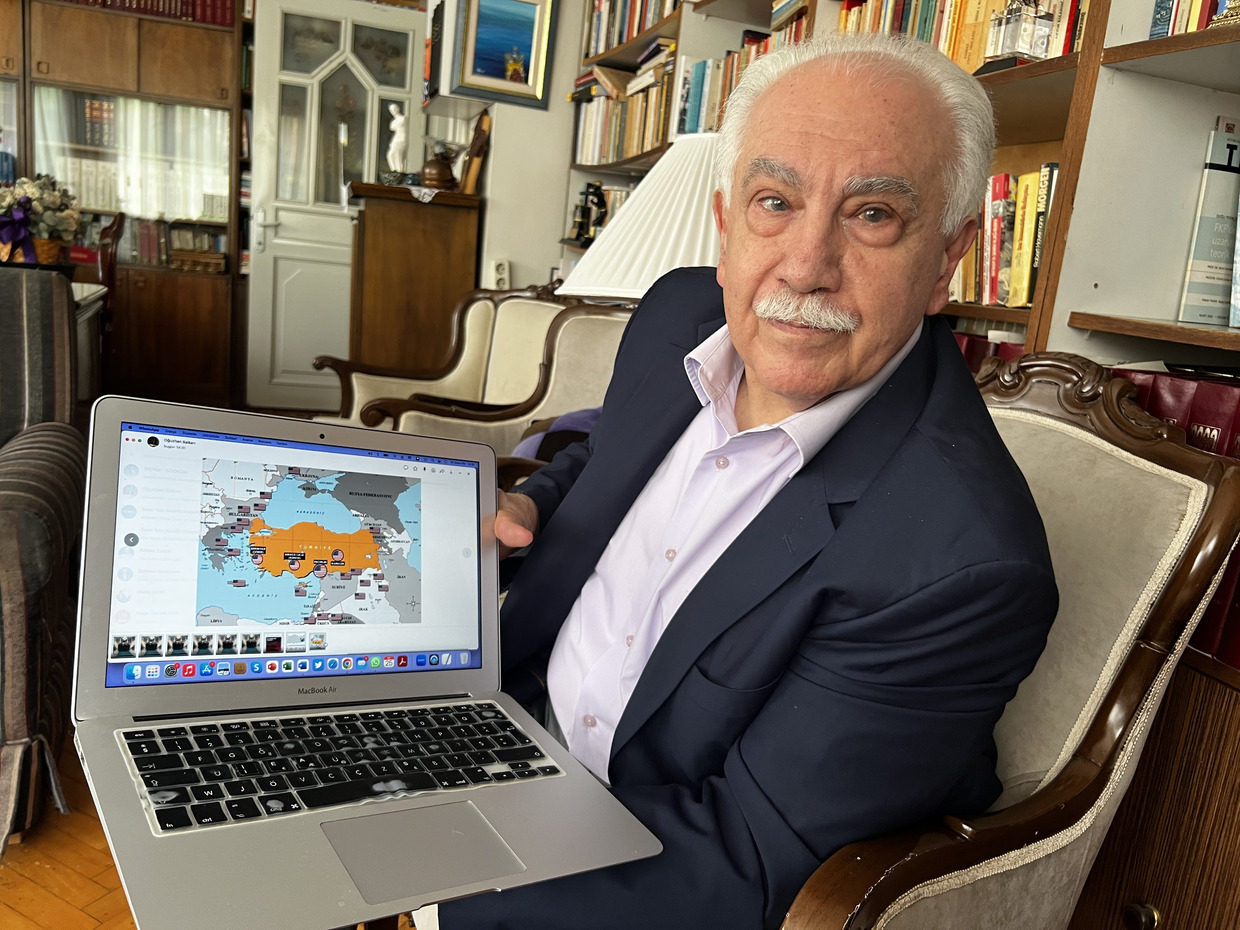 Dogu Perincek study a map of US military bases in Türkiye
© Abbas Juma
Dogu Perincek study a map of US military bases in Türkiye
© Abbas Juma
RT: But there is no legal mechanism for withdrawing from the alliance…
Dogu Perincek: Our people have already withdrawn from it. If you were to hold a referendum today, 80% of the Turkish population would vote in favor of leaving the North Atlantic alliance.
Atlanticists vs patriots
RT: However, when it comes to the Russia-Ukraine conflict, Türkiye is on the side of NATO. For example, we’ve recently heard about the construction of a factory for the production of Bayraktar drones near Kiev.
Dogu Perincek: The division between the Atlanticists and patriots occurs in Türkiye at all levels. It also exists within the ruling party. The accession of Sweden and Finland to NATO and Türkiye’s policy in regard to Ukraine demonstrate that Atlanticism in Türkiye is still extremely strong.
Read more ‘Islamic world will celebrate the destruction of Israel’: Is war inevitable between Tehran and West Jerusalem?
‘Islamic world will celebrate the destruction of Israel’: Is war inevitable between Tehran and West Jerusalem?
RT: And what about the Turkish president – whose side is he on? Returning to the issue of producing Turkish UAVs in Ukraine, we may note that this campaign is headed by Erdogan’s son-in-law.
Dogu Perincek: Erdogan’s son-in-law Selcuk Bayraktar represents Atlantic interests. The Atlanticists want him to replace his father-in-law as the leader of the ruling party and of the country.
However, we cannot say that Erdogan himself fully supports the Atlanticists, because he understands very well that the Americans aren’t pleased with him. No matter how hard [Erdogan] tries to get closer to Washington, they will not accept him there. In this regard, the cancellation of the Turkish leader’s official visit to the US in May is quite telling.
The Palestinian issue and Iran are weakening Western influence in Türkiye
RT: How did Türkiye and especially the Turkish elites react to the situation in Palestine and Iran’s attack on Israel?
Dogu Perincek: In the beginning [of the conflict], Erdogan did not want to make a specific decision regarding Palestine. But the desperate struggle of the Palestinian people forced him to take their side.
The October 7 Hamas attack [on Israel] and Iran’s strike dealt a serious blow to the Atlanticists in Türkiye. A few days ago, I attended a meeting at the Iranian Embassy concerning the Iranian armed forces. Turkish generals were present at this meeting. This is noteworthy, because high-ranking Turkish military officials did not attend such events in the past.
Of course, the West is trying to fight Iran’s influence in the region and in Türkiye. In particular, it makes use of religious radicals to fuel the Shiite-Sunni conflict, but without much success.
Conclusion
In the course of our conversation, Perincek recalled his trip to Moscow in 1996. On this official visit, he met with several high-ranking Russian officials. According to Perincek, at the time he saw that “the great Russian spirit was suppressed.” But time passed and Russia got back on its feet.
“Once, under [former Russian President Boris] Yeltsin, you also followed a self-destructive course. But then the Russian people decided to focus on strengthening [Russia’s] sovereignty instead of integrating with the West. And that saved you,” Perincek said.
In the case of Türkiye, Perincek is sure that things will happen much faster since the process was launched ten years ago, and it won’t be long before the country comes out of the crisis – and then, perhaps even withdraws from NATO.
-
Site: PaulCraigRoberts.org
I am exhausted from Watching the West Self-destruct
Paul Craig Roberts
As a former postgraduate member of Merton College, Oxford University, I receive every year from Merton College a thick, well prepared report replete with color photos titled Postmaster and the Merton Record. The report provides a thorough report on everything associated with the college and present and past members as reported during the year. For example, undergraduate performance and prizes, publications and awards of faculty, concerts, the performance of the various sports teams, social events, reports of marriages, deaths, births, remembrances from past graduates, photographs of the college, gardens, and members, and books on the library’s shelves as if to say that here at Merton we still have the timeless products of Western Civilization in print form on library shelves instead of online somewhere in the cloud. In the current issue, those still alive who attended JRR Tolkien’s lectures provide their memories of this remarkable scholar of ancient languages and storyteller (The Hobbit, and The Lord of the Rings). It all reminds us that at Merton some semblance, some remnant of Britain’s ancient lineage lingers still among the tower of babel England has become.
No doubt the expense and effort to which the college goes to remain in touch with past members–all of whom compose The Merton Society–has in mind bequests. Little doubt Merton graduates attribute part of their success in life to the preparation that Merton gave them. So the large expense of the preparation and distribution of this report is justified. But for my generation and perhaps the one following I wonder about the impact of the report. Clearly, for my generation the collage is no more. It is simply there only in the buildings and memories. The college is no longer a men’s college. Gowns no longer exist. Merton even has female Wardens (presidents). As far as I can tell, and I am unsure, Oxford colleges are now organized like American colleges where students take courses and are graded on the course and graduate when they complete the designated course requirements.
In my day there were no courses and no course requirements. Unlike the US, a bachelor’s degree was a three, not a four-year, process. A student selected a field–mathematics, science, history, literature, languages, classics, PPE (philosophy, politics, and economics–imagine an American student learning all three in three years!) and was assigned a tutor by the college. The student was handed a reading list and encouraged to attend lectures on his chosen field of study. Lectures were provided by lecturers, senior lecturers, (`I am unsure if Oxford had the next rank, readers, or whether these were only at the “red brick universities”) and professors. If memory serves, in the entirety of Oxford colleges there were only two professors of economics. One was a theorist John R. Hicks, and the other, John Jewkes, was an empirical economist who was a member of Merton.
As there were no classes, the purpose of the Oxford gown was to admit you to lectures. As a student at an Oxford college it was your responsibility to prepare for the exam at the end of three years which would determine whether you got a first, a second, a pass, or a fail. A first was a pass into the City (England’s Wall St) or the civil service and a successful career. The colleges didn’t want any results below a second and so tutors did their best to motivate any students who might come up short on motivation.
When you stood for exams, you knew they would be sent to other universities for grading. In those days, integrity was important, and universities did not want to raise integrity questions by being accused of grading their own students easily in order to give them a push ahead. Standards and honor had to be preserved. In those days a first from Oxford or Cambridge was almost as good as being born into an aristocratic family that somehow still managed to have some money despite the dispossession of the aristocracy by the government.
Today all of this is gone, and it is very sad. My impression, I would be happy to be wrong, is that Oxford and Cambridge have been partly, not totally, placed in the role of selling entry into the First World to sons and daughters of well-to-do Indian, African, Asian, and Middle Eastern families. At times over the years I have noticed that white males have almost disappeared from the photographs in Postmaster, although not in the current issue. The aristocratic class seems to have faded away, and with an Indian prime minister of Great Britain and a Muslim Mayor of London, it is unclear in whose hands the British economy rests. Jaguar, for example, once the dominate power at Le Mans and the creator of what Enzo Ferrari himself declared to be the most beautiful car ever made–the E-Type, a specimen of which resides in permanent display in the New York Museum of Modern Art–has passed through a variety of foreign owners and I am unsure where its ownership resides today.
As readers of the few accurate histories of World War II know, US President Roosevelt used the war to destroy England’s leadership of the world economy and to turn the British into a satrapy of the American Empire. The greatest and most accurate of all WW II historians, David Irving, makes it clear that while Churchill was at war with Germany, Roosevelt was at war with England. It was Roosevelt who won. But don’t expect any Oxford historians to say this.
Reading what I have written, it is clear that these matters have been on my mind for some time as I have been diverted from my intention, which was to remark that the important fact of which the Merton College Record has made me aware is that as women, women have disappeared. Today women occupy male roles. With men’s roles colonized by women, there are no longer any male roles.
The Merton hockey team has more female than male members. When I was at Oxford, rugby was more violent than US football. The 11 member Merton rugby team has 4 female members.
What is my point? Nowhere in the 222 page report is that any woman in a woman’s role except on the childbirth page where female Merton graduates have done the dirty on feminism and become married mothers. But there are very few of them, an insufficient number to keep Briton British.
It is astonishing to me how rapidly the Western World has collapsed compared to the long drawn-out time required for Rome to disappear. One would think that, unlike Rome under pressure from external armies, the West with no one attacking it should be able to prolong its continuing existence despite the West’s lost of belief in itself.
But apparently, this is not to be.
The question of the survival of Western civilization is not raised at Oxford, Cambridge, Harvard, Yale, Princeton, Stanford. Indeed, they all seem to want Western civilization not to continue as they have branded it racist. Nowhere is there university faculty with interest to defend truth and the continuation of Western civilization’s existence.
The foundation of the Western world is the pursuit and defense of truth. When that no longer exists, neither does Western civilization.
-
Site: PaulCraigRoberts.org
-
Site: Mises InstituteAs progressives attempt to redefine racism to fit modern political fantasies, we need to look at historical examples of ethnic discrimination to better understand our current situation.
-
Site: Zero HedgeThat's Nuts! $700K Of Cocaine Found In Almond Bags During Traffic StopTyler Durden Mon, 05/06/2024 - 06:55
The California Highway Patrol found 15 lbs of cocaine with a street value of $700,000 during a traffic stop in Merced Country on April 27, the CHP reported.
 A CHP officer found suspected cocaine in bags containing almonds during a traffic stop April 27, 2024. (California Highway Patrol)
A CHP officer found suspected cocaine in bags containing almonds during a traffic stop April 27, 2024. (California Highway Patrol)
Around 3:15 p.m., a 2010 Subaru driving on I-5 around 30 miles west of Merced was pulled over for a traffic violation. During the stop, the officer became suspicious and conducted a search using a K-9 officer, a CHP spokesman told the Epoch Times.
"It was just a normal traffic stop," said CHP Officer Gregorio Rodriguez. "That’s kind of what usually happens. Something was out of the ordinary. The officer did see some criminal indicators and the dog hit on the bags of almonds."
During the search, the police dog sniffed out the cocaine, divided into 1-kilogram amounts and factory sealed within bags containing almonds. The driver, 20-year-old Angel Lopez Velasco of Mt. Vernon, Washington, and his passenger, 20-year-old Jennifer Cisneros of Burlington Washington, were arrested and booked into the Merced County Jail on suspicion of possessing a controlled substance for sale, as well as transporting a controlled substance across noncontinguous counties.
The case is currently in the hands of the Merced Area Gang Narcotics Enforcement team, according to the report.
-
Site: southern orders
The restoration of the baldichinno continues. It seems to me that another solution would have been better, meaning a temporary altar placed over the confession. I have seen the floor in front of the papal altar extended over it and that would have been a better solution. At any rate, it is all temporary.
-
Site: Zero HedgeTrump Says Jack Smith Should Be "Arrested" After Documents RevelationTyler Durden Mon, 05/06/2024 - 06:30
By Jack Phillips of The Epoch Times
Former President Donald Trump argued that special counsel Jack Smith’s classified documents case against him should be tossed after prosecutors wrote that they misled a judge about the order of items in an evidence box.
In a post on Truth Social over the weekend, President Trump called for the arrest of Jack Smith and argued that the case should be thrown out based on the new court filing.
It came after Mr. Smith’s team wrote that that the order of items within a box was “not the same” as they appear in digital photographs of materials after the FBI obtained those boxes from President Trump’s Mar-a-Lago home in August 2022.
“Since the boxes were seized and stored, appropriate personnel have had access to the boxes for several reasons, including to comply with orders issued by this Court in the civil proceedings noted above, for investigative purposes, and to facilitate the defendants’ review of the boxes,” Mr. Smith’s team told U.S. District Judge Aileen Cannon last week.
They added that there are “some boxes where the order of items within that box is not the same as in the associated scans.”
His team also acknowledged in a footnote that federal prosecutors effectively misled the court after telling the judge that the evidence was exactly the same when it was seized. “The Government acknowledges that this is inconsistent with what Government counsel previously understood and represented to the Court,” the footnote said.
Mr. Smith’s team provided multiple “possible explanations” as to why the documents were rearranged after seizing the boxes from Mar-a-Lago, according to the filing.
“There are several possible explanations, including the above-described instances in which the boxes were accessed, as well as the size and shape of certain items in the boxes possibly leading to movement of items,” they wrote. “For example, the boxes contain items smaller than standard paper such as index cards, books, and stationary, which shift easily when the boxes are carried, especially because many of the boxes are not full.”
But President Trump wrote that Mr. Smith’s filing is effectively an admission of what he has “been saying happened since the Illegal RAID on my home, Mar-a-Lago, in Palm Beach ... that he and his team committed blatant Evidence Tampering by mishandling the very Boxes they used as a pretext to bring this Fake Case.”
He then called for the case to be immediately dropped.
President Trump has pleaded not guilty to 40 charges connected to allegations that he illegally retained classified documents at his home after leaving in January 2021 and obstructed officials’ attempts to retrieve them. Two of his aides, Walt Nauta and Carlos de Oliveira, have also been charged in the case.
Legal group Judicial Watch also suggested that Mr. Smith’s classified documents case against President Trump should be tossed after the admission.
Judicial Watch head Tom Fitton wrote on X that prosecutors’ latest filing suggesting that there was “evidence tampering” involved is “yet more reason to throw out this sham prosecution.”
He said that the filing also included an FBI “admission” that the agency was “completely screwing with the classified documents.”
Continue reading at The Epoch Times
-
Site: Zero HedgeTrump Says Jack Smith Should Be "Arrested" After Documents RevelationTyler Durden Mon, 05/06/2024 - 06:30
By Jack Phillips of The Epoch Times
Former President Donald Trump argued that special counsel Jack Smith’s classified documents case against him should be tossed after prosecutors wrote that they misled a judge about the order of items in an evidence box.
In a post on Truth Social over the weekend, President Trump called for the arrest of Jack Smith and argued that the case should be thrown out based on the new court filing.
It came after Mr. Smith’s team wrote that that the order of items within a box was “not the same” as they appear in digital photographs of materials after the FBI obtained those boxes from President Trump’s Mar-a-Lago home in August 2022.
“Since the boxes were seized and stored, appropriate personnel have had access to the boxes for several reasons, including to comply with orders issued by this Court in the civil proceedings noted above, for investigative purposes, and to facilitate the defendants’ review of the boxes,” Mr. Smith’s team told U.S. District Judge Aileen Cannon last week.
They added that there are “some boxes where the order of items within that box is not the same as in the associated scans.”
His team also acknowledged in a footnote that federal prosecutors effectively misled the court after telling the judge that the evidence was exactly the same when it was seized. “The Government acknowledges that this is inconsistent with what Government counsel previously understood and represented to the Court,” the footnote said.
Mr. Smith’s team provided multiple “possible explanations” as to why the documents were rearranged after seizing the boxes from Mar-a-Lago, according to the filing.
“There are several possible explanations, including the above-described instances in which the boxes were accessed, as well as the size and shape of certain items in the boxes possibly leading to movement of items,” they wrote. “For example, the boxes contain items smaller than standard paper such as index cards, books, and stationary, which shift easily when the boxes are carried, especially because many of the boxes are not full.”
But President Trump wrote that Mr. Smith’s filing is effectively an admission of what he has “been saying happened since the Illegal RAID on my home, Mar-a-Lago, in Palm Beach ... that he and his team committed blatant Evidence Tampering by mishandling the very Boxes they used as a pretext to bring this Fake Case.”
He then called for the case to be immediately dropped.
President Trump has pleaded not guilty to 40 charges connected to allegations that he illegally retained classified documents at his home after leaving in January 2021 and obstructed officials’ attempts to retrieve them. Two of his aides, Walt Nauta and Carlos de Oliveira, have also been charged in the case.
Legal group Judicial Watch also suggested that Mr. Smith’s classified documents case against President Trump should be tossed after the admission.
Judicial Watch head Tom Fitton wrote on X that prosecutors’ latest filing suggesting that there was “evidence tampering” involved is “yet more reason to throw out this sham prosecution.”
He said that the filing also included an FBI “admission” that the agency was “completely screwing with the classified documents.”
Continue reading at The Epoch Times
-
Site: Real Investment Advice
The latest FOMC meeting caused a stock rally as Jerome Powell turned more “dovish” than expected. While Powell did note that progress on inflation has been lackluster, the announcement of the reversal of “Quantitative Tightening” (QT) excited the bulls.
Beginning in June, the Committee will slow the pace of decline of its securities holdings by reducing the monthly redemption cap on Treasury securities from $60 billion to $25 billion. The Committee will maintain the monthly redemption cap on agency debt and agency mortgage‑backed securities at $35 billion and will reinvest any principal payments in excess of this cap into Treasury securities”
Of course, the reversal of QT means a buyer of Treasury bonds is returning to the market, increasing overall market liquidity. It also means the Treasury will issue $105 billion less in gross in Q3. The bond market also got the memo, as the Fed’s return to the bond market suggests lower yields in the months ahead, easing financing pressure in the economy.
We have previously discussed the following chart of “liquidity,” which subtracts the Treasury General Account and Reverse Repo from the Federal Reserve’s balance sheet. The recent market decline coincided with a sharp drop in liquidity as the TGA account surged to almost $1 trillion from April tax receipts. Over the next few months, that liquidity in the TGA will get released into the economy. At the same time, the Federal Reserve will reduce its balance sheet runoff, which will further add to overall liquidity.

Notably, the market has weathered the reduction in liquidity to date. While higher rates and the reversal of “Quantitative Easing” led to a 20% market decline in 2022, investors began to “front run” the Fed in anticipation of rate cuts and a return to balance sheet expansion.

Given that “QE” programs increase bank reserves by crediting their reserve accounts for bonds bought, the introduction of the tapering of “QT” is the first step in increasing system liquidity.

This is why there was a vicious stock rally last week. For the markets, this rang “Pavlov’s Bell.”

The Correction May Not Be Over Just Yet
While the stock rally last week certainly surprised many, given the weaker-than-expected economic data, there are some reasons to suspect the correction may not be complete just yet.
In mid-March, we suggested that due to the “buyback blackout” window, a 5-10% correction was likely. To wit:
“As noted, the market remains in a bullish trend. The 20-DMA, the bottom of the trend channel, will likely serve as an initial warning sign to reduce risk when it is violated. That level has repeatedly seen ‘buying programs’ kick in and suggests that breaking that support will cause the algos to start selling. Such a switch in market dynamics would likely lead to a 5-10% correction over a few months.“
The following month, the market violated that 20-DMA, and selling commenced, leading to a 5.5% drawdown. However, buyers initially stepped back in at the 100-DMA, which has now acted as support over the last two weeks. With the rally last week, the stock rally is now testing crucial resistance at the 50-DMA.

The stock rally is at a critical juncture, and what happens next will determine whether the current market correction is over. Three possible scenarios over the next month or so exist.
Path A: The market breaks above the 50-DMA and retests previous highs. While this path is indeed possible, the markets are overbought on a very short-term basis, suggesting further price appreciation will become more challenging.
Path B: Many investors were surprised by the recent market decline. As such, these “trapped longs” will likely use the current stock rally as an opportunity to reduce risk. Another retest of the 100-DMA seems probable before the next leg of the current bull rally ensues.
Path C: With earnings season mostly behind us and stock buybacks set to resume, a reversion to the 200-DMA seems the least probable. However, as is always the case, it is a risk that we should not ignore. A sharp uptick in inflation or stronger-than-expected economic data could spark concerns about a “higher for longer” Fed policy. Such an event would likely lead to a further repricing of risk assets.

I am less concerned about “Path C” for three reasons.

Little Evidence Of Market Stress
While a more profound decline is certainly possible, there is little evidence of market stress. For example, even during the latest correction, volatility remained very subdued. Yes, volatility increased during the decline but failed to reach the levels witnessed during the 10% correction last summer.

Secondly, a substantially deeper market decline would likely widen credit spreads between junk bonds and treasuries. That was not evident during the latest market decline, as spreads remain well below the long-term average. Watching credit spreads is the best indicator for investors to determine market risks.

Third, the window for stock buybacks reopens this week, and with Apple and Google announcing $110 and $70 billion programs, respectively, those two companies alone will account for roughly 18% of this year’s slated activity.

Combining current sentiment, buybacks, and liquidity hopes makes the stock rally over the last two weeks logical. Furthermore, given that early summer months tend to be bullish for markets during election years, it is likely too soon to be overly bearish.

However, we are also not completely oblivious to the numerous risks that lie ahead. Weaker economic data, the lag effect from higher rates, and sticker inflation pose portfolio risks worth monitoring. Furthermore, in the two months before the election, investors tend to de-risk their portfolios. This year, we could see a larger-than-normal event, given the risks associated with the current matchup.
While Powell’s “dovish” twist fueled the current stock rally, continue to manage risk accordingly. There is a reasonable chance this correction is not over just yet.
The post Stock Rally As Powell Sparks A Buying Frenzy appeared first on RIA.
-
Site: Zero HedgeBiden Administration Finalizes Rule To Allow 'Dreamers' To Enroll In 'Obamacare'Tyler Durden Mon, 05/06/2024 - 05:45
Authored by Jana J. Pruet via The Epoch Times (emphasis ours),
The Biden administration announced on Friday that it had finalized a directive to expand the Affordable Care Act (ACA), also known as “Obamacare,” to thousands of immigrants who were brought to the United States as children.
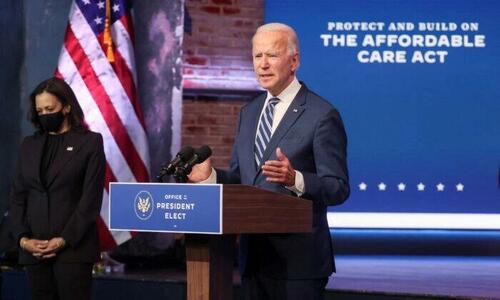 U.S. President Joe Biden talks about protecting the Affordable Care Act (ACA) as he speaks to reporters with Vice President Kamala Harris at this side about their "plan to expand affordable health care" during an appearance in Wilmington, Del., Nov. 10, 2020. (Jonathan Ernst/Reuters/File Photo)
U.S. President Joe Biden talks about protecting the Affordable Care Act (ACA) as he speaks to reporters with Vice President Kamala Harris at this side about their "plan to expand affordable health care" during an appearance in Wilmington, Del., Nov. 10, 2020. (Jonathan Ernst/Reuters/File Photo)
The Centers for Medicare and Medicaid (CMS) estimates that “this rule could lead to 100,000 previously uninsured DACA [Deferred Action of Childhood Arrivals] recipients enrolling in health care through Marketplaces or a BHP [Basic Health Program],” the Department of Health & Human Services (HHS) said in a press release.
The move took longer than promised and fell short of President Joe Biden’s initial proposal to allow those migrants access to Medicaid, which provides free or low-cost health care coverage to the nation’s lowest-income people.
But it will allow thousands of immigrants, known as “Dreamers,” to access tax breaks when they sign up for coverage after the Affordable Care Act’s marketplace enrollment opens Nov. 1, just days before the presidential election.
“Today, my Administration is expanding affordable, quality health care coverage to Deferred Action for Childhood Arrivals (DACA) recipients,” President Biden said in a statement on Friday. “Dreamers are our loved ones, our nurses, teachers, and small business owners. And they deserve the promise of health care just like all of us.”
The measure could boost Biden’s appeal among Hispanic voters, a crucial voting bloc that he needs to turn out at the polls.
“I’m proud of the contributions of Dreamers to our country and committed to providing Dreamers the support they need to succeed,” President Biden said. “That’s why I’ve previously directed the Department of Homeland Security to take all appropriate actions to ‘preserve and fortify’ DACA. And that’s why today we are taking this historic step to ensure that DACA recipients have the same access to health care through the Affordable Care Act as their neighbors.”
The move drew criticism from presidential candidate Donald Trump’s campaign spokeswoman, Karoline Leavitt, on Friday.
“Joe Biden continues to force hardworking, taxpaying, struggling Americans to pay for the housing, welfare, and now the healthcare of illegal immigrants,” Ms. Leavitt said in a statement on X. “This is unfair and unsustainable, and Joe Biden’s handouts for illegal immigrants are especially devastating to Black Americans, Hispanic Americans, and union workers who are forced to watch their jobs and public resources stolen by people who illegally entered our country.
“President Trump will put America and the American worker first, she continued. ”He will seal the border, stop the invasion, and expand economic opportunity for American citizens, not illegal aliens.”
Any participant in the Obama-era DACA program will be eligible to access health care through the government marketplace.
HHS Secretary Xavier Becerra said that many of those migrants have delayed getting care because they lack coverage.
“They incur higher costs and debts when they do finally receive care,” Mr. Becerra told reporters on a call. “Making Dreamers eligible to enroll in coverage will improve their health and well-being and strengthen the health and well-being of our nation and our economy.”
New Definition for ‘Lawfully Present’
The administration modified the definition of “lawfully present,” which is used to determine eligibility for coverage so that DACA participants can legally enroll on the marketplace exchange.
“These changes aim to ensure complete, accurate, and consistent eligibility determinations and verification processes for health coverage for these populations,” HHS wrote.
The DACA initiative was launched by then-President Barack Obama to protect immigrants from deportation who were brought to the United States illegally by their parents as children. The program allowed them to work legally in the country.
However, the “Dreamers” were still ineligible for government-subsidized health insurance programs because they did not meet the definition of having a “lawful presence” in the United States.
Senior officials told reporters that the administration chose not to expand Medicaid eligibility for Dreamers after receiving 20,000 comments on the proposal during the public comment period. They declined to explain why it took so long to finalize the rule, which was proposed in April 2023. The delay kept the immigrants from enrolling for coverage this year.
At one point, as many as 800,000 immigrants were enrolled in DACA, though now that figure is roughly 580,000. Officials predict only about 100,000 will actually sign up because some may get coverage through their workplaces or other ways, and others may not be able to afford coverage through the marketplace.
Other classes of immigrants, including asylum seekers and people with temporary protected status, are already eligible to purchase insurance through the ACA marketplaces.
Last year, President Biden also unveiled a regulation aimed at fending off legal challenges to DACA; former President Donald Trump moved to end the policy, and it has bounced back and forth in federal court. Last fall, a federal judge said the current version can continue at least temporarily.
“President Biden and I will continue to do everything in our power to protect DACA, but it is only a temporary solution,” Vice President Kamala Harris said in a statement. “Congress must act to ensure Dreamers have the permanent protections they deserve.”
-
Site: RT - News
A military defeat for Kiev might compel Washington to send service members to the country, Congressman Hakeem Jeffries has said
The US may have to deploy troops to Ukraine if Kiev suffers a complete collapse against Russia, House Minority Leader Hakeem Jeffries has warned.
In an interview with CBS News released on Sunday, the senior Democratic lawmaker suggested that if Kiev cannot win the war with Russia using billions if dollars worth of US military aid, Washington could potentially have to intervene directly in the conflict.
“We can’t let Ukraine fall because if it does, then there’s a significant likelihood that America will have to get into the conflict – not simply with our money, but with our servicewomen and our servicemen,” Jeffries said.
This stance, however, contradicts the long-standing policy of US President Joe Biden, who reiterated last month that he was “determined” not to send American troops to Ukraine. He noted that Kiev had so far not requested direct military intervention from Washington, expressing the belief that it could win the conflict with Russia if the US “stand[s] with Ukraine and provide[s] the weapons it needs to defend itself.”
Read more Ukraine could request Western military intervention – MP
Ukraine could request Western military intervention – MP
Meanwhile, Jeffries claimed that US efforts to support Ukraine, including pushing a new $61 billion assistance package through Congress, had been stymied by what he called a “pro-Putin faction” within the Republican Party.
He singled out Republican Congresswoman Marjorie Taylor Greene, who has called for funds to be used for domestic needs, rather than sent to Ukraine. Greene has insisted she “does not have any sympathy for… Russia” and that she is “only loyal to a single country: the United States of America.”
Jeffries’ comments about possible US intervention come after French President Emmanuel Macron refused to rule out sending Western troops to Ukraine. Last week, he suggested that Western nations “would legitimately have to ask [them]selves” whether they should deploy their militaries to the embattled country “if the Russians were to break through the front lines, [and] if there were a Ukrainian request.” Macron has further insisted that rhetoric of “strategic ambiguity” could project strength and deter Russia.
In response, Russian Foreign Minister Sergey Lavrov suggested on Sunday that the French leader was “breathing caveman Russophobia” in the hope of using this sentiment to become the de-facto leader of the EU.
Kremlin spokesman Dmitry Peskov warned in late February that the deployment of NATO troops to Ukraine would make a direct conflict between Russia and the US-led military bloc “inevitable.”
In the meantime, the Russian military has reported steady progress on the battlefield, capturing several settlements in Donbass in recent weeks.
-
Site: Fr Hunwicke's Mutual EnrichmentThe three Rogation Days are upon us! Instituted in Gaul around 475 'to repel calamities'; to ask that God will ... in the words of Cranmer's translations of the Litanies ... "give and preserve to our use the kindly fruits of the Earth"*, they served also to impress upon parishioners and outsiders alike the parochial identity, both social and territorial. Hence their in-your-face nature. Watch outFr John Hunwickehttp://www.blogger.com/profile/17766211573399409633noreply@blogger.com0
-
Site: Crisis Magazine

Last week the U.S. House of Representatives, in a 320-91 vote, approved the Anti-Semitism Awareness Act (ASAA), requiring the Department of Education to expand the definition of anti-Semitism as demanded by the International Holocaust Remembrance Alliance (IHRA). This bipartisan measure, expected to be adopted by the Senate, comes at a time when police authorities are seeking to suppress anti…
-
Site: Crisis Magazine

In “Veni Creator,” his lyric address to the Holy Spirit, Czeslaw Milosz reminds God of a couple of things, basic facts which, of course, God already knows: I am only a man: I need visible signs. I tire easily, building the stairway of abstraction. It probably never occurred to one of Poland’s premier poets of the last century that his hunger for concrete connection might work both…
-
Site: Zero HedgeOPEC+ Likely To Extend Production Cuts In JuneTyler Durden Mon, 05/06/2024 - 05:00
By John Kemp, senior energy analyst at Reuters
Saudi Arabia and its allies in OPEC⁺ are likely to keep oil production unchanged for a further three months when ministers review output allocations on June 1.
The tightening of petroleum supplies and depletion of inventories widely anticipated at the start of the year has failed to materialise so far. If OPEC+ officials had hoped to increase production into a tightening market characterised by rising oil prices they are likely to be frustrated.
Crude stocks, futures prices and calendar spreads are all at similar levels to a year ago, making a significant increase in output unlikely.
The group may nonetheless decide it needs to rescind some of last year’s output cuts to pre-empt a further rise in production from the United States, Canada, Brazil and Guyana and avoid conceding more market share.
But current market conditions mean any increase is likely to be symbolic, in the absence of a wholesale shift in strategy to increase volumes and accept lower prices.
PRICES AND SPREADS
Front-month Brent futures have averaged $84 per barrel so far in May putting them exactly in line with the average since the start of the century after adjusting for inflation.
Prices have risen by just $6 per barrel (7%) compared with a year ago when the group was planning production cuts to boost them.
Brent’s six-month calendar spread has traded in an average backwardation of $3.54 (86th percentile for all months since 2000) so far in May compared with $1.81 (60th percentile) this month in 2023.
The increased backwardation implies traders see the market somewhat tighter than in 2023 with a greater likelihood inventories will deplete over the rest of 2024. But the backwardation has been breaking down in recent weeks and has already narrowed from an average of $4.86 (95th percentile) in April.
Despite an increase in tensions across the Middle East, causing a temporary rise in the war risk price premium, there has been no actual impact on oil supplies, and the premium has largely faded.
Diplomatic efforts have contained conflict between Iran and Israel, with no impact on either oil production or tanker exports from the Persian Gulf.
Tanker traffic has been re-routed from the Red Sea and the Gulf of Aden around the Cape of Good Hope to avoid drone and missile attacks from Houthi fighters based in Yemen.
U.S. OIL INVENTORIES
In the United States, commercial crude inventories are at almost the same level as this time last year and close to the prior ten-year seasonal average. Commercial crude stocks amounted to 461 million barrels on April 26 compared with 460 million barrels a year earlier.
Crude inventories were just 5 million barrels (-1% or -0.11 standard deviations) below the prior ten-year seasonal average.
There have been no signs of a significant and sustained draw down of inventories that would indicate the market has been under-supplied.
Most U.S. crude inventories are held at coastal refineries and tank farms along the Gulf of Mexico, which is also the region most closely integrated with the global sea-borne market.
Gulf of Mexico stocks amounted to 262 million barrels on April 26, which was 6 million barrels above the same time last year...
...and 15 million barrels (+6% or +0.57 standard deviations) above the ten-year seasonal average.
The United States is not the whole global market but given the efficiency with which traders move barrels to exploit local discrepancies between production and consumption, it is a good marker for the global balance.
U.S. crude inventories, global futures prices and to some extent softening calendar spreads all point to a market fairly close to balance. Portfolio investors certainly seem to think so, with roughly equal upside and downside risks to prices.
On April 23, hedge funds and other money managers held a net long position in futures and options linked to crude prices equivalent to 453 million barrels (46th percentile for all weeks since 2013).
The position was an increase from 388 million barrels (29th percentile) at the same point in 2023 but was basically neutral.
Neither fund managers nor physical traders are signalling the need for an increase in production from Saudi Arabia and its OPEC⁺ allies in the third quarter.
PRODUCTION POLICY
Senior OPEC ministers and officials stress the group’s policy is to be proactive and forward-looking. That may be true when it comes to reducing production to avert an increase in excess inventories and stabilise prices.
When it comes to increasing production, however, the group has normally waited until stocks have fallen and prices have already risen significantly.
In this instance, inventories and prices close to the long-term average imply ministers are likely to decide to keep output unchanged, based on their behaviour in the past. In the last decade, OPEC⁺ production cuts have propped up prices and supported continued growth in output from outside the group especially in the western hemisphere.
Some members of the organisation have expressed concerns about the loss of market share and pushed to increase production.
So far, Saudi Arabia has led OPEC⁺ in cutting production to reduce stocks and boost prices at the expense of volumes.
There are questions about the long-term sustainability of this strategy, but so far there's no sign of a fundamental rethink.
If ministers eventually decide the loss of market share has gone too far, they could cite stronger forecast demand and a predicted future decline in inventories to justify boosting production.
That would reveal a major change in strategy to prioritise volume over prices and there is no sign of it yet. If OPEC⁺ nonetheless decides to announce an output increase, it is likely to be small and symbolic.
-
Site: AsiaNews.itMore than five million seek employment over the age of 60 to survive. Those in the less developed regions in the north, east and south are in the greatest difficulty. In Bangkok 'only' 25% have to work. Public pensions are inadequate, difficult to access a private or company pension fund.
-
Site: RT - News
Facts get lost and emotions dominate on the internet, the US Secretary of State has said
Social media is partially responsible for the widespread international criticism of Israel’s conduct during its military campaign in Gaza, US Secretary of State Antony Blinken has suggested.
The top American diplomat made the comment during an exchange with Senator Mitt Romney (R-Utah) at the McCain Institute’s 2024 Sedona Forum in Sedona, Arizona on Friday.
Romney asked Blinken why “the PR [has] been so awful” for Israel amid the conflict in Gaza. “Why has [Palestinian armed group] Hamas disappeared in terms of public perception? An offer is on the table to have a ceasefire, and yet the world is screaming about Israel,” he said. “Typically, the Israelis are good at PR. What’s happened here?” Romney said.
The Secretary of State recalled that when he started working in Washington in the early 1990s “everyone did the same thing,” which was reading newspapers like The New York Times, The Washington Post and The Wall Street Journal, and watching national news networks to get information about world events.
But now, in the 2020s, “we are on an intravenous feed of information with new impulses, inputs every millisecond” and social media “has dominated the narrative,” he said.
Read more US froze military aid shipment to Israel – Axios
US froze military aid shipment to Israel – Axios
"And you have a social media ecosystem environment in which context, history, facts get lost, and the emotion, the impact of images dominates. And we can’t – we can’t discount that, but I think it also has a very, very, very challenging effect on the narrative,” Blinken suggested.
However, he also stressed that another reason for Israel’s bad PR was the “the inescapable reality of people who have and continue to suffer grievously in Gaza. And that’s real and we have to… be focused on that and attentive to that.”
Israel has faced harsh criticism from the international community due to the high number of civilian casualties during its attacks in the enclave over the past seven months. In March, UN experts ruled that there were “reasonable grounds” to believe that “genocide” was being committed in the Palestinian enclave.
In recent weeks, colleges across the US have been gripped by pro-Palestinian protests, which have been marred by clashes with police and resulted in several thousand people being detained.
READ MORE: Pro-Palestine protesters disrupt college commencement ceremony (VIDEOS)
Israel launched its military operation in Gaza in response to a October 7 cross-border incursion by Hamas, in which at least 1,200 people were killed and 250 taken hostage. According to the enclave’s health ministry, more than 34,683 Palestinians have so far been killed and 78,018 others wounded in the IDF’s airstrikes and ground offensive.
-
Site: Zero HedgeMaryland Officials Release Timeline And Cost Estimate For Rebuilding Baltimore BridgeTyler Durden Mon, 05/06/2024 - 04:15
In the wake of a catastrophe that claimed the lives of six roadwork crew members and disrupted one of the nation’s busiest ports, Maryland has committed to a monumental task of rebuilding the Francis Scott Key Bridge. The project, set to be completed by the fall of 2028, is projected to cost between $1.7 billion and $1.9 billion, according to David Broughton, spokesperson for the Maryland Department of Transportation.
 Workers remove wreckage of the collapsed Francis Scott Key Bridge (AP/Matt Rourke)
Workers remove wreckage of the collapsed Francis Scott Key Bridge (AP/Matt Rourke)
The announcement comes as state and federal agencies press forward with recovery efforts following the bridge's tragic collapse on March 26, which not only resulted in significant loss of life but also temporarily shut down the Port of Baltimore. The collapse occurred when a container ship, having lost power, struck one of the bridge’s main supports.
Fifth body recovered
Salvage operations achieved a somber milestone late Wednesday with the recovery of Miguel Angel Luna Gonzalez, 49, from Glen Burnie, Maryland, marking the last of five missing people identified after the accident. Gonzalez, along with the other victims, was working on the bridge when the disaster struck, AP reports.
Salvage teams found one of the missing construction vehicles Wednesday and notified the Maryland State Police, officials said. State police investigators and Maryland Transportation Authority Police officers and the FBI responded to the scene and recovered the body inside a red truck. The state police underwater recovery team and crime scene unit also assisted.
Governor Wes Moore expressed his condolences, reflecting the collective heartache: “We continue to pray for Miguel Angel Luna Gonzalez, his family, and all those who love him, acknowledging the anguish they have experienced since the Key Bridge collapsed. We pray for comfort, we pray for healing, and we pray for peace in knowing that their loved one has finally come home.”
 (Photo: AP/Matt Rourke)
(Photo: AP/Matt Rourke)
The detailed engineering plans for the new bridge are still under development, with state officials emphasizing both the urgency and the complexity of the design process. The new span not only promises to restore a critical infrastructural node but also aims to be a beacon of safety and innovation to prevent future tragedies.
Meanwhile, the broker for the bridge’s insurance policy confirmed Thursday that a $350 million payout will be made to the state of Maryland in what is expected to be the first of many payouts related to the collapse.
Chubb, the company that insured the bridge, is preparing to make the $350 million payment, according to WTW, the broker. Douglas Menelly, a spokesperson for WTW, on Thursday confirmed plans for the payout, which was first reported by The Wall Street Journal. Chubb did not immediately respond to a request for comment Thursday.
The Maryland Transportation Authority said Thursday that the state’s treasurer filed a claim on the day of the bridge’s collapse “against our $350 million property policy and put on notice our $150 million liability policy first tier carrier on behalf of MDTA.” -AP
The FBI, alongside Maryland State Police and the Maryland Transportation Authority Police, continues to investigate the circumstances surrounding the collapse, ensuring that the lessons learned from this tragic event will forge a safer path forward for all.
-
Site: AsiaNews.itToday's news: Families begin Rafah evacuation while Gaza ceasefire talks remain stalled;Pakistani farmers announce a march against falling wheat prices; In Malaysia, data centres boom in the Johor region, very close to Singapore;Four Jehovah's Witnesses sentenced in Russia to six and a half years for 'terrorist activity'.
-
Site: Zero HedgeElon Musk Warns Over Biden's Massive Deficit SpendingTyler Durden Mon, 05/06/2024 - 03:30
Authored by Tom Ozimek via The Epoch Times (emphasis ours),
Tesla CEO Elon Musk has sounded the alarm on the Biden administration’s massive deficit spending, warning that unless steps are taken to slow down the growth of America’s national debt, the U.S. dollar will become worthless.
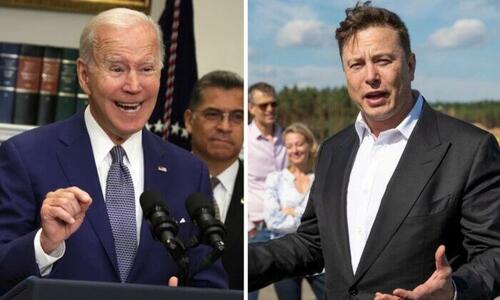 President Joe Biden (L) at the White House in Washington, on July 8, 2022; Tesla head Elon Musk (R) talks to the press near Berlin on Sept. 3, 2020. (Alex Wong/Getty Images; Maja Hitij/Getty Images)
President Joe Biden (L) at the White House in Washington, on July 8, 2022; Tesla head Elon Musk (R) talks to the press near Berlin on Sept. 3, 2020. (Alex Wong/Getty Images; Maja Hitij/Getty Images)
“We need to do something about our national debt or the dollar will be worth nothing,” Mr. Musk said in a post on X.
The billionaire tech mogul was reacting to a post about Gen. H.R. McMaster warning that the world is on the cusp of World War III and calling for a doubling of defense spending to prepare for potential threats.
We need to do something about our national debt or the dollar will be worth nothing
— Elon Musk (@elonmusk) May 3, 2024Mr. Musk has repeatedly advocated for a negotiated end to the conflict in Ukraine to put a halt to the loss of life.
For instance, during a February conversation on X with Sen. Ron Johnson (R-Wis.), Mr. Musk said the Wisconsin Republican was “exactly right” when the lawmaker said that additional U.S. aid to Ukraine had only prolonged a bloody stalemate and that the only way the war ends is through a negotiated settlement.
Besides being an advocate for ending the war in Ukraine, Mr. Musk has been a repeated critic of the U.S. government’s massive deficit spending.
‘Overspending Must Stop’
Mr. Musk has repeatedly criticized the Biden administration’s huge spending bills.
For instance in December 2021, he expressed concern for the “insane” federal deficit and said he would “can” President Joe Biden’s “Build Back Better” bill that cost over $2 trillion and was estimated by the non-profit watchdog Committee for a Responsible Federal Budget to add $160 billion to deficits over ten years.
More recently, Mr. Musk warned that a reckoning would eventually come for America’s ballooning national debt.
“US national debt growth is unsustainable,” Mr. Musk said in a Feb. 12, 2024 post. He was reacting to a post indicating that the interest payments on America’s $34 trillion national debt were already around $1 trillion a year and projected to rise to $3 trillion annually in less than ten years.
In March, Mr. Musk reacted to a post indicating that it took roughly 63 percent of all personal income taxes in February 2024 just to pay the interest on America’s $34 trillion national debt.
“Overspending must stop or America will go bankrupt,” Mr. Musk posted at the time.
Entrepreneur Ed Krassenstein reacted to Mr. Musk’s latest May 4 warning about the need to rein in out-of-control deficit spending by saying in a post that no administration is willing to tackle the national debt problem because the long-term “fix is likely a short term detriment to the economy.”
Mr. Musk replied: “Well, something’s gotta give. We should at least slow down the debt growth.”
‘Higher Taxes Are Likely’
Like Mr. Musk, billionaire investor Warren Buffett has also warned about the “important consequences” of deficit spending. However, the Berkshire Hathaway founder predicted that, when push comes to shove, the government would opt to raise taxes rather than reduce spending.
“I think higher taxes are likely,” Mr. Buffett said on May 4 at Berkshire Hathaway’s annual shareholder meeting in Omaha.
“They may decide that some day they don’t want the fiscal deficit to be this large because that has some important consequences. So they may not want to decrease spending and they may decide they’ll take a larger percentage of what we own, and we’ll pay it,” he said.
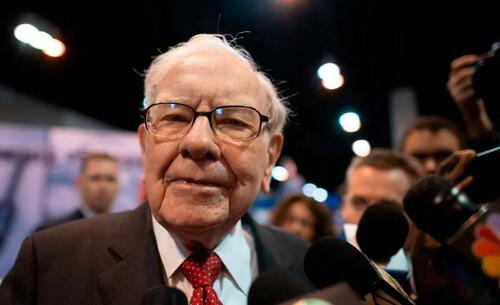 Warren Buffett (C), CEO of Berkshire Hathaway, speaks to the press as he arrives at the 2019 annual shareholders meeting in Omaha, Nebraska, May 4, 2019. (Johannes Eisele/AFP via Getty Images)
Warren Buffett (C), CEO of Berkshire Hathaway, speaks to the press as he arrives at the 2019 annual shareholders meeting in Omaha, Nebraska, May 4, 2019. (Johannes Eisele/AFP via Getty Images)
Deficit spending in the United States hit $1.7 trillion in 2023, or 6.3 percent of gross domestic product (GDP), according to a recent report from the Congressional Budget Office (CBO). The agency estimated that deficit spending would grow to 8.5 percent of GDP by 2054.
At the same time, CBO projected that America’s debt-to-GDP ratio, which in the 1980s was around 35 percent of GDP, will grow to 166 percent by 2054, while warning that this would pose “significant risks” to America’s fiscal and economic outlook.
Analysts at the University of Pennsylvania estimate that when the debt-to-GDP ratio hits around 200 percent, it will hit the point of no return—when no amount of future tax increases or spending cuts could prevent the government from defaulting on its debt.
“Unlike technical defaults where payments are merely delayed, this default would be much larger and would reverberate across the U.S. and world economies,” they explained.
Under a “best case” scenario, the University of Pennsylvania analysts estimate that the United States has around 20 years to take corrective action before the growing debt spiral spins out of control.
JPMorgan CEO Jamie Dimon has predicted that America’s debt-to-GDP ratio would “hockey stick” upward at some point, meaning rise sharply and become unsustainable after a period of relatively gradual increase.
“It is a cliff. We see the cliff. It’s about 10 years out. We’re going 60 miles an hour,” Mr. Dimon said, speaking on a panel at the Bipartisan Policy Center in Washington at the end of January 2024.
The International Monetary Fund (IMF) has also sounded the alarm on the Biden administration’s fiscal stance, warning that its massive deficit spending and ballooning public debt threaten to stoke inflation and—potentially—even spark financial chaos.
-
Site: AsiaNews.itOn the border between Kazakhstan and Beijing, instead of camels and flocks, there are rows of increasingly imposing trucks loaded with new vehicles for the Asian and Russian markets. Among the Kazakhs there is mistrust of the symbols of Beijing's 'invasion', but the large trade centre of the free trade zone is now a destination for 'pilgrimages' like the historic wooden mosque.
-
Site: Zero HedgeBoeing Supplier Spirit Aerosystems Sues To Block Texas Safety ProbeTyler Durden Mon, 05/06/2024 - 02:45
The same day that a second Boeing-linked whistleblower death on Tuesday, supplier Spirit Aerosystems filed a lawsuit against Texas Attorney General Ken Paxton after he opened a safety probe into the company in late March.
Filed in Austin, Spirit is alleging that Paxton's demand for internal documents and other information is unlawful, and violates their right against unreasonable search and seizure.
Paxton opened the investigation into Spirit following "reoccurring issues with certain airplane parts provided to Boeing," including a midair blowout of an Alaskan Airlines 737 MAX door panel two months prior.
Spirit Aerosystems filed its lawsuit (pdf) against Mr. Paxton the same day that its former quality auditor, Joshua “Josh” Dean, died from a “sudden, fast-spreading infection,” according to reports. Mr. Dean came forward as a whistleblower against the Boeing manufacturer and alleged that it ignored numerous problems with the 737 MAX as early as 2012.He is the second Boeing-related whistleblower to die after John “Mitch” Barnett was found dead from an alleged self-inflicted gunshot wound the morning of a court appearance. The same attorney was representing both men in their efforts to testify about quality-control problems persistent within Boeing and its supplier, Spirit AeroSystems. -Epoch Times
Spirit is a key supplier of fuselages and other components for Boeing. Meanwhile, the Biden DOJ is mulling whether the Alaskan Airlines incident breached a deferred prosecution agreement with Boeing, which was set to expire two days later (so, absolutely yes?).
According to Spirit spokesman Joe Buccino, the supplier "brought this litigation seeking a determination whether the Texas statute at issue is constitutional under existing case law within the Fifth Circuit and the U.S. Supreme Court," adding that they don't plan to comment further.
Spirit alleges that Paxton's probe "bears no connection to events occurring in the State of Texas and as such has, at best, a questionable law enforcement purpose," since they only operate a single facility in Texas which houses 98 of the company's 20,655 employees.
On March 28, Paxton released a statement justifying his safety probe into Spirit.
"The potential risks associated with certain airplane models are deeply concerning and potentially life-threatening to Texans," he wrote, adding "I will hold any company responsible if they fail to maintain the standards required by the law and will do everything in my power to ensure manufacturers take passenger safety seriously."
-
Site: Mises Institute
-
Site: Mises InstitutePrivate property rights are under fire by progressive elites -- even those these same elites protect their own property fiercely. But without these rights, a functioning economy is not possible.
-
Site: Zero HedgeBiden's New Carbon Capture Mandates Will Cause Blackouts, Increases PricesTyler Durden Mon, 05/06/2024 - 02:00
By Mish Shedlock of MishTalk
The lie of the day is from the EPA: Carbon capture will pay for itself (thanks to IRA subsidies). No, it won’t even with subsidies. Expect blackouts and a higher price for electricity.
Suite of Standards to Raise Costs, Reduce Output
Let’s take a dive into the EPA news release Biden-Harris Administration Finalizes Suite of Standards to Reduce Pollution from Fossil Fuel-Fired Power Plants
“Today, EPA is proud to make good on the Biden-Harris Administration’s vision to tackle climate change and to protect all communities from pollution in our air, water, and in our neighborhoods,” said EPA Administrator Michael S. Regan. “By developing these standards in a clear, transparent, inclusive manner, EPA is cutting pollution while ensuring that power companies can make smart investments and continue to deliver reliable electricity for all Americans.”
A final rule for existing coal-fired and new natural gas-fired power plants that would ensure that all coal-fired plants that plan to run in the long-term and all new baseload gas-fired plants control 90 percent of their carbon pollution.
The final emission standards and guidelines will achieve substantial reductions in carbon pollution at reasonable cost. The best system of emission reduction for the longest-running existing coal units and most heavily utilized new gas turbines is based on carbon capture and sequestration/storage (CCS) – an available and cost-reasonable emission control technology that can be applied directly to power plants and can reduce 90 percent of carbon dioxide emissions from the plants.
Lower costs and continued improvements in CCS technology, alongside tax incentives from President Biden’s Inflation Reduction Act that allow companies to largely offset the cost of CCS, represent recent developments in emissions controls that informed EPA’s determination of what is technically feasible and cost-reasonable. The Bipartisan Infrastructure Law also includes billions of dollars to advance and deploy CCS technology and infrastructure. EPA projects that the sector can comply with the standards with negligible impact on electricity prices, thanks to cost declines in CCS and other emissions-reducing technologies. EPA analysis also finds that power companies can comply with the standards while meeting grid reliability, even when considering increased load growth.
Final EPA Rule
The EPA’s Final Rule is only 1,020 pages long. There were 953 references to carbon capture and sequestration/storage (CCS).
I went through some of those 953 references and found these tidbits.
CCS is an adequately demonstrated technology that achieves significant emissions reduction and is cost-reasonable, taking into account the declining costs of the technology and a substantial tax credit available to sources.
The first component of the BSER [Best System of Emission Reduction] for base load combustion turbines is highly efficient generation (based on the emission rates that the best performing units are achieving) and the second component for base load combustion turbines is utilization of CCS with 90 percent capture.
One of the key GHG [Greenhouse Gasses] reduction technologies upon which the BSER determinations are founded in these final rules is CCS—a technology that can capture and permanently store CO2 from fossil fuel-fired EGUs.
I confess. I did not read all 1020 pages and don’t intend to. I have seen enough by reading through a dozen or so of the 953 references to CCS.
Returning to the Biden-Harris document I note references to “reasonable cost” and “largely offset the cost of CCS.” Thus CCS is admittedly not cost effective even with subsidies.
IISD Sustainable Development
For a rebuttal to the above Biden claims, please consider the International Institution for Sustainable Development article Why Carbon Capture and Storage Is Not a Net-Zero Solution for Canada’s Oil and Gas Sector
The poor track record of CCS in Canada is part of a broader trend. According to the Global CCS Institute (2022), the global growth of carbon captured by commercially operating CCS facilities has been much slower than anticipated. As of September 2022, only 30 commercial CCS projects are operating across all sectors around the world, capturing 42.5 Mtpa. This falls far short of the IEA’s (2009) previous target of 300 Mtpa by 2020. Most proposed projects have been withdrawn: of the 149 CCS projects anticipated to be storing carbon by 2020, over 100 were cancelled or placed on indefinite hold (Abdulla et al., 2020; Wang et al., 2021). In the United States, despite significant industry and government investment in the technology, more than 80% of proposed CCS projects have failed to become operational due to high costs, low technological readiness, the lack of a credible financial return, and dependence on government incentives that are withdrawn. Of those projects that are operating globally, 73% of the carbon captured is used for EOR.
Put simply, proponents of CCS have repeatedly over-promised on the technology’s ability to reduce emissions, and CCS projects have under-delivered.
CCS is both energy and capital intensive. The greatest amount of energy is required for the capture and compression of carbon, with additional amounts needed for transportation and storage. Capture and compression alone require 330–420 kWh per tonne of CO2 captured. CCS projects increase the energy demand of the facility they capture carbon from by 15%–25% on average, which stands to increase emissions given that the energy used to capture CO2 is often natural gas-powered electricity. In general, the technology is highly energy inefficient and generates its own emissions.
The above doc largely pertains to carbon capture in Canada’s Oil and Gas Sector, not electricity production, bit it is instructive on the difficulty of and inefficacy of carbon capture.
The lead CCS image is from that post.
Biden EPA’s Plan to Ration Electricity
The Wall Street Journal calls the CCS mandate Biden EPA’s Plan to Ration Electricity
Section 111 of the Clean Air Act says the EPA can regulate pollutants from stationary sources through the “best system of emission reduction” that is “adequately demonstrated.” Carbon capture is neither the best nor adequately demonstrated. As of last year, only one commercial-scale coal plant in the world used carbon capture, and no gas-fired plants did.
EPA says Inflation Reduction Act tax credits and funding in the 2021 infrastructure bill will “incentivize and facilitate the deployment” of carbon capture. But subsidies would have to be two to three times larger to make the technology cost-effective at a coal plant. Carbon capture reduces a plant’s efficiency, which also raises costs.
Because carbon capture uses 20% to 25% of the electricity generated by a power plant, less will be available to the grid. That means more generators will be needed to provide the same amount of power. But new gas-fired plants won’t be built because the technology will make them uneconomic. Talk about a catch-22.
Another problem: CO2 must be stored underground in certain geologic formations, largely in the upper Midwest and Gulf Coast. Permitting new wells for CO2 injections can take six years. Pipelines to transport CO2 can take even longer. Green groups oppose pipelines for CO2 as they do for oil and natural gas.
All of this will hit while demand for power is surging amid new manufacturing needs and an artificial intelligence boom. Texas’s grid operator this week raised its forecast for demand growth for 2030 by 40,000 megawatts compared to last year’s forecast. That’s about seven times the power that New York City uses at any given time.
Texas power demand will nearly double over the next six years owing to data centers, manufacturing plants, crypto mining and the electrification of oil and gas equipment. When temperatures in Texas recently climbed into the 80s, the grid operator told power plants not to shut down for maintenance. Americans around the country are increasingly being told to raise their thermostats during the summer and avoid running appliances to prevent blackouts.
Even some Democrats are noticing the pinch on their voters’ pocketbooks. Reps. Marcy Kaptur, Henry Cuellar, Mary Sattler Peltola, Vicente Gonzalez and Jared Golden last weekend urged President Biden to defer finalizing EPA’s power-plant rules because they could “inadvertently exacerbate existing problems related to the unaffordability of electricity” and cause “increased risks to electric reliability.”
Mr. Biden’s new rules will surely draw a legal challenge. But as litigation plays out, the tremendous uncertainty will delay investment in much-needed new gas plants. Americans didn’t face energy rationing in Mr. Biden’s first term, but they might in a second.
The Inflation Reduction Act Keeps Biting in Predictable Ways
Biden plans to reduce inflation by raising costs, producing less electricity when more is needed, force people into EVs without a capable grid, pipeline captured carbon when the pipelines don’t exist and allegedly increase reliability.
It’s so stupid even some Democrats are concerned. Well not to worry, this can all be done at a “reasonable cost” with costs “largely offset” thanks to the IRA.
Expect blackouts and a much higher price for electricity as a key component of “reasonable cost”.


